 23/02/2011 02:33 23/02/2011 02:33 |
|
| | | OFFLINE | | Post: 22.177
Post: 4.804 | Registrato il: 28/08/2005
Registrato il: 20/01/2009 | Administratore | Utente Master | |
|


 See preceding page for earlier posts on 2/22/11.
See preceding page for earlier posts on 2/22/11.


 Here is the second and concluding part of the interview with Mons. Fellay, superior-general of the FSSPX. Unfortunately, there are so many more questionable and objectionable statements here than in Part 1 (posted in the preceding page of this thread). A note at the end of the text says this:
[The interview was conducted at St. Thomas Aquinas Seminary in Winona, MN on February 2, 2011, the Feast of the Presentation of the Child Jesus and the Purification of the Blessed Virgin.
Here is the second and concluding part of the interview with Mons. Fellay, superior-general of the FSSPX. Unfortunately, there are so many more questionable and objectionable statements here than in Part 1 (posted in the preceding page of this thread). A note at the end of the text says this:
[The interview was conducted at St. Thomas Aquinas Seminary in Winona, MN on February 2, 2011, the Feast of the Presentation of the Child Jesus and the Purification of the Blessed Virgin.
Our thanks to the Information Service of the General House and to the French and American editorial teams which translated and copy-edited the answers of Bishop Bernard Fellay.]
Questions for Mons. Fellay
Part 2 of an interview by

February 2011
Beatification of John Paul II
29. Does the announcement of the approaching beatification of John Paul II pose a problem?
A serious problem, the problem of a pontificate that caused things to proceed by leaps and bounds in the wrong direction, along “progressive” lines, toward everything that they call “the spirit of Vatican II”. This is therefore a public acknowledgment not only of the person of John Paul II but also of the Council and the whole spirit that accompanied it. [Those statements are unbelievably hostile and unfair! While it is true that John Paul II was unable to attenuate (much less, smother) 'the spirit of Vatican II' in the 26 years of his Pontificate, he did not encourage it in any way. Also, the Vatican II issues that he chose to 'push' prominently were inter-faith dialog, new ecclesiastical movements, and new evangelization (which was the reason for all his globetrotting). But all that has nothing to do with his personal holiness. The beatification process did not evaluate him as a Pope but as Karol Wojtyla who also happened to have become Pope. A Pope would have had to be patently unholy (a murderer and an adulterer as Alexander Borgia was reputed to be) or have led the Church into a cataclysmic war or some such catastrophe, to have his record as Pope virtually exclude him from even being considered for beatification!]
30. Has there been a new concept of sainthood and holiness since Vatican II?
Afraid so! It is a concept of holiness for everybody, universal sanctity. It is not wrong to say that there is a call, a vocation to holiness for all human beings; but what is wrong is to lower holiness to a level that makes people believe that everyone is going to Heaven.
[The Church certainly does not say that. And Benedict XVI has been most explicit and consistent in his frequent calls for holiness as within the reach of every Christian.]
31. How could true miracles be permitted by God to authenticate a false teaching, in the case of the many beatifications and canonizations that have been performed in recent decades?
That is the whole problem: are these real miracles? Are these prodigies? In my opinion, there are doubts. I am very surprised by the casualness with which they are dealing with these things, as far as I know.
[Both the question and the answer are most insulting and even un-Christian! Who is the interviewer to label what the Roman Catholic church teaches as 'false'? Just because you disagree with Vatican II does not mean all of its teachings are false, even if much of the interpretation of such teachings have been misguided and/or wrong!
The proceedings of the Congregation for the Causes of Sainthood are not secret, and I believe all the acts related to each cause that proceeds to beatification and canonization are open for review and research. John Paul II was criticized for instituting what others have called 'a saintmaking factory', but his rationale was that modern Catholics need to look to more examples of saintly lives, including contemporary figures, to emulate. And it is most unworthy of Fellay to say that the processes followed for beatifications and canonizations have been casual in any way.]
32. If canonization involves papal infallibility, could one reject the new saints canonized by the Pope?
It is true that there is a problem there, on the question of contemporary canonizations. Nevertheless one could ask the question of whether there is a true intention to invoke infallibility in the terms that are used by the Supreme Pontiff. They changed these terms for [the ceremony of] canonization; they have become much less strong than before. I think that that goes along with the new mentality that does not want to make dogmatic definitions by invoking infallibility. We should realize, however, that this is only a tentative explanation…. There is no satisfactory answer, except the one about the intention of the supreme authority to invoke his infallibility or not.
[If Fellay and the FSSPX question any of the beatifications and canonizations that have taken place 'in recent decades', why don't they identify those that they find 'questionable' and face the local dioceses (and in many cases, religious orders) who first presented the causes for these Blesseds and Saints? None of these causes have advanced without the existing veneration by the local people who were exposed to the lives led by their candidates for sainthood! Even beatification of many hundreds of priests and laymen martyred during the Spanish Civil War was made possible by the memories they left among the people who knew them and witnessed how they met their death.]
33. Can we choose among the saints recently proposed to the faithful to venerate? What about Padre Pio?
I think that we must not choose. However one can always keep the criteria that were universally recognized in the past as well; thus, when there is a massive popular devotion, for example, to Fr. Maximilian Kolbe or to Padre Pio; it should not cause any difficulty. But once again, these are only opinions, in the absence of a magisterial judgment to be pronounced dogmatically.
[The question about choosing whom to venerate was ignorant, and at least Fellay answered it properly. However, what 'magisterial judgment to be pronounced dogmatically' is he talking about? Does not the proclamation of beatification and/or canonization proclaim magisterial judgment and dogma, in the broader sense of 'established belief' held by the Catholic faith?]
34. Do you have any examples of graces obtained by the intercession of Archbishop Lefebvre?
Yes, we know about some, indeed, quite a few. But I do not know whether they are really on the order of miracles, perhaps in one case or another. When we’re talking about healings, we don’t have, as far as I know, all the necessary medical documents. Many graces are obtained through the Archbishop’s intercession, but I will go no farther than that.
[One would think the Lefebvrians would postulate a cause for Lefebvre's beatification - his life as a priest and bishop before the schism was, from all accounts, exemplary and outstanding. But it seems that the very idea of having to ask Rome for anything is keeping them from doing the right thing by Lefebvre. But perhaps more decisive is that Lefebvre became knowingly schismatic and that this could a priori exclude him from being considered for beatification. (I am speculating in this last statement - I haven't checked this out!]]
The FSSPX
35. The Society has just celebrated an important anniversary. How would you summarize these forty years?
An inspiring history… with many tears in the midst of great joys. One of the greatest joys is the joy of realizing the extent to which Our Lord allows us to be associated with several of the beatitudes that He preached in the Sermon on the Mount, like the one about being able to suffer for the sake of His Name.
And through all the vicissitudes of the present crisis, we see that this work continues to grow, which, humanly speaking, is almost impossible. This is certainly the mark of God on the work of Archbishop Lefebvre.
36. Has there been an increase in vocations? If so, what are the reasons for it?
I think that there is great stability. I would like to see more vocations. I think that we will have to restart the crusades for vocations. The world as such is very hostile to the fostering of vocations; that is why we have to try to recreate everywhere climates in which vocations can once again develop. There are many vocations, but often they do not get to mature because of this materialistic world.
37. You commented recently, at the Conference in Rome sponsored by Le Courrier de Rome, on a meeting of around thirty diocesan priests in Italy that you attended. What do those priests expect today from the Society of St. Pius X?
These priests ask us above all for doctrine, which is an excellent sign. If they are with us, it is of course, because they want the old Mass, but after discovering the old Mass, they want something else. They want something more, because they discover a whole world that they know is authentic. They have no doubt that it is the true religion. Then they need to brush up on their theological studies. And they are not mistaken: they go directly to St. Thomas Aquinas.
[I think those Italian priests have not been reading or listening to Benedict XVI at all, because if they want doctrine, he has it - and he preaches it so constantly and so clearly and so well, including whatever Vatican II has left by way of Magisterium. But if they have 'discovered' the old Mass because of Summorum Pontificum, then they ought to know better! I can almost bet it also happens that their bishops are all dissidents, so what they get from them is not doctrine but anti-doctrine!]
38. This movement of priests who are turning to the Society, is it, in varying degrees, the same in all countries?
There are certainly varying degrees, and even different numbers depending on the country. But we see the same phenomenon almost everywhere: The priest, generally a young one, who approaches the Traditional Mass, who discovers with great enthusiasm this treasure, little by little travels a path toward Tradition, which finally makes him completely traditional. [But not necessarily electing to abandon communion with Rome!]
39. Do you have hope that this sort of interest could affect some bishops, to the point where you foresee a future collaboration?
We already have contacts with some bishops, but for the moment everything is frozen by the bishops’ conferences, by the pressures all around, but there is no doubt whatsoever that in the future it will be possible for there to be forms of collaboration with some bishops.
40. Are you ready to attempt the experiment of Tradition with a bishop at the level of a diocese?
The time for that is not yet ripe; we are not there yet, but I think that it will happen. It will be difficult; we will have to look closely at how we can manage to achieve that. It will be absolutely necessary that this be done with bishops who have really understood the crisis and who really want to work with us. [Bishops who truly understand the crisis, as Benedict XVI sees it, will work with Benedict XVI first, not primarily with the FSSPX.]
41. The lay faithful [affiliated with the SSPX] are increasingly numerous. There are more and more chapels. The state of necessity is still present. Do you foresee the consecration of other auxiliary bishops for the Society? Do you think that Rome could be in favor of episcopal consecrations in Tradition today?
For me, the answer is very simple: there will either be bishops or else there will not, depending on whether or not the circumstances that prevailed at the first consecration [in 1988] are present again.
[Fellay is being disingenuous. If the FSSPX community were really growing the way he implies, they would long ago have consecrated more bishops, but they have remained at four (now effectively 3, since they have grounded Williamson) since 1988. IMHO, Fellay himself does not feel secure enough, because of his own illegitimate consecration as bishop, to then compound the problem by consecrating other bishops!]
Expansion of the SSPX in the USA
42. Your Excellency, we have the joy of seeing you often in the United States. You like to travel here. Could you comment?
My comment: I love all the souls that the Good Lord has entrusted to us, and there are quite a few in the United States. That’s all!
43. Have you been able to meet Cardinal Burke yet?
I have tried several times to see him, but I have not seen him yet.
[Burke may be traditionalist in many ways, but he is traditional in one of the most important things- which is communion with the Church and the Pope!]
44. A large number of bishops in the United States showed their support for the March for Life; one of them even intervened forcefully against a [Catholic] hospital that was in favor of abortion. Is there any hope that they will realize that the crisis involves the Faith also?
I think that, unfortunately, with modern clergymen you have to distinguish between faith and morals. Thus you will be able to find more bishops who are still responsive to moral problems than bishops who are concerned in questions of faith.
However we can tell ourselves that if someone very courageously defends Catholic morality, he must have the faith, and his faith will be reinforced by it…. That is what I hope, while recognizing that there are some exceptions.
45. The American bishops want to revise together the directives given by John Paul II for the universities. What, in your opinion, are the urgent measures that should be taken to turn today’s universities into authentic Catholic universities?
The first and most urgent measure is to return to Scholasticism. They have to get rid of those modern philosophies and return to the sound philosophy, the objective, realist philosophy. Saint Thomas must become the norm again, as at the beginning of the twentieth century.
St. Thomas must become the norm again, as at the beginning of the 20th century. The 24 Thomistic theses were obligatory, were presented as obligatory. We have to go back to them — that is absolutely necessary. And after that, it will be possible and necessary to continue along the same line with theology.
46. Bishop Robert Vasa of Baker Diocese (Oregon) recently recalled that the statements of a bishops’ conference could not be binding on a bishop in his diocese. Is this re-litigating [calling into question again] the line of thinking started by the Council?
On this question of collegiality, it is not just a bishop who has spoken up. The Pope himself, in addressing the Brazilian Bishops’ Conference, had some very strong words that put the role of Episcopal Conference in its place, and insisted on the personal authority of the bishops and on their direct relations with the Holy Father.
[Well said, for a change! Even as a cardinal, Benedict XVI was critical of the fact that the bishops' conferences - which have no theological basis at all - have been counter-productive because they enable individual bishops to shirk taking personal responsibility for decisions within their own diocese and hide behind the inexistent authority within the diocese of an episcopal conference position! Many bishops professing the fallacious 'spirit of Vatican II' have interpreted the bishops' conference to be the equivalent of a 'national Vatican' with superior authority over their local churches than the real Vatican itself has!]
47. [Of all SSPX institutions,] the Seminary in Winona has the largest number of seminarians. How do you explain that?
I think that it is quite simply due to the generosity of this country, which is readily inspired by a good cause.
48. What can be done to increase the number of priestly and religious vocations?
Pray, pray, pray! Make sacrifices, too. [One of the admirable things the FSSPX is this strong reliance on prayer.]
49. What are the strong points of the world of Tradition in the United States?
I think that there is this generosity that I just mentioned, and also the schools. It is true that there is an impressive number of priests and that we would still need more, but I would say above all that the schools are indispensable.
We must also encourage aid to Traditional families. We have to start a movement for families, to support and form them. They are the primary cell of society. The family is fundamental in the natural order and in the supernatural order.
50. In your opinion, Your Excellency, what is the importance of the schools?
They are of capital importance. They are the future. The young people will be Catholic if they have a good formation, but for that we need Catholic schools.
51. When parents are generous and therefore have large families, they are sometimes forced to home-school their children. What do you recommend to those who have access to good schools?
Those who have access to good schools should not hesitate one moment: let them put their children in those schools! Home schooling will never replace a good school. If there is no good school, that obviously is a different matter.
52. Do you expect, Your Excellency, to call for another Rosary crusade? What do you recommend to the lay faithful today?
Yes! The situation of the world, the situation of the Church — as anyone can see — continues to be very somber, even though there are some glimmers of hope, and these distressing elements oblige us more than ever to redouble the intensity of our prayers, while turning to the Blessed Virgin.
For the lay faithful today, the indispensable thing is prayer: especially family prayer which is frequently renewed, together with the essential thing that forms the Christian soul, that is, the spirit of sacrifice.
53. Your Excellency, next year you will celebrate 30 years in the priesthood, 18 of them as the head of the Society of St. Pius X. What were the major events during all those years?
That is quite a novel! …Of course, I have first to mention the consecrations! Other major events are the joy of having been an assistant to Archbishop Lefebvre, the joy of having been an assistant to Fr. Schmidberger, of having learned a lot at their sides, also the joy of being able to work with the other bishops of the Society, as well as with all our priests, in that great burst of zeal for the Faith, for the preservation of the Catholic Church.
54. Any wish for the years to come?
That the Church will get back on track! This is a metaphor, but it is truly our wish. And for that to happen, the triumph of the Immaculate Heart of the Most Blessed Virgin has to come about. We need it so much!
Obviously, the generous initiatives shown by Benedict XVI towards the FSSPX in his effort to repair the one formal rift in the Roman Catholic Church indicate some trust on his part that the Lefebvrians' objections to Vatican II can be met with reason and patience, not to mention good faith. The only reason I have been posting about the FSSPX whenever there is something newsworthty or interesting to post about them is to track the course of Benedict's initiative.
I have always tended to give Fellay the benefit of the doubt - and even grant that he says and writes certain things because he is playing to his base, particularly to his financial supporters - but I can't do it with many of his answers in this interview, some of which sound very much like bad faith to me....
And it seems like Fellay has raised the bar from the original goal of the doctrinal talks with the CDF - to answer FSSPX objections to certain key Vatican II statements regarding religious freedom, ecumenism, and collegiality - to now, an implied demand for the Church to reject all of Vatican II. He knows that is not possible at all. Of the 21 ecumenical councils recognized by the Roman Catholic Church, only one - the Council of Pisa in 1409, which attempted to heal the Great Western Schism (when two or even three persons at a time claimed to be Pope), which was not called by a Pope - was revoked by the subsequent Council of Constance which did resolve the schism. There is no such technical or practical reason to revoke Vatican II.
But a Pope can institutionalize an interpretation or interpretations of Vatican-II as Benedict XVI did with Summorum Pontificum, with regard to celebrating the traditional Mass, and as John Paul II did in 2001 with Liturgiam Ecclesiam, which laid down the norms for translations of the liturgy into the vernacular.
On the question of religious freedom and ecumenism, the FSSPX is clearly wrong and completely close-minded. There can and there should be religious freedom and ecumenism - they do not compromise the Catholic faith in any way, provided the Catholics stand firm on their core beliefs while engaging in inter-faith and intra-Christian dialog.
And while we're at it, has the FSSPX ever asked itself what harm they have been doing to Christian unity? By being so uncompromising - instead of following the example of other more reasonable traditionalist societies like the Fraternal Society of St. Peter or the Institut Bon Pasteur to be in full Communion with Rome, while having specific questions about Vatican II, as don't we all, for that matter!
It has never happened in the history of the Church, even when it was much smaller in numbers, that a fractional minority - less than 1 million Lefebvrians in a worldwide Catholic population of 1.18 billion - became the tail that wagged the dog! But if their Christian witness is strong enough to set aside their breast-beating sanctimony and live in full communion with the Church, then they could wield much greater influence among Catholics. .
[Modificato da TERESA BENEDETTA 11/04/2011 14:19] |
| |
|
| |
 23/02/2011 12:35 23/02/2011 12:35 |
|
| | | OFFLINE | | Post: 22.179
Post: 4.806 | Registrato il: 28/08/2005
Registrato il: 20/01/2009 | Administratore | Utente Master | |
|
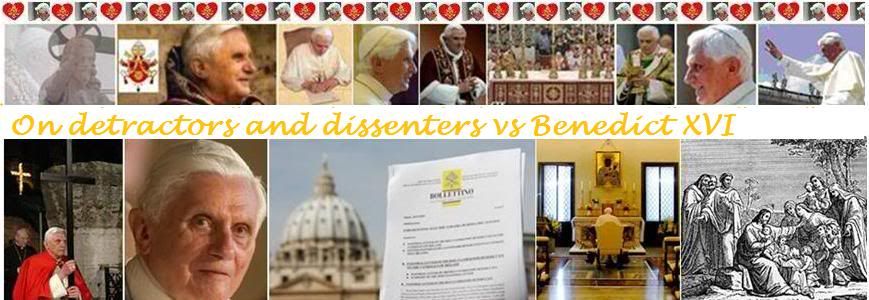 And we thought the UK anti-Papists were vicious! Look at what two Germans have done! - duly presented for the delectation of Irish anti-Catholics in their 'bible'... I just hope someone will come up right away with what this grandstand play means in terms of what the notorious ICC can actually do with these preposterous nuisance claims. Especially, can they please just throw them out PDQ on the grounds of malicious silliness and close off at least one avenue of publicity-hounding for these two bigots?...
Charges initiated against Pope
And we thought the UK anti-Papists were vicious! Look at what two Germans have done! - duly presented for the delectation of Irish anti-Catholics in their 'bible'... I just hope someone will come up right away with what this grandstand play means in terms of what the notorious ICC can actually do with these preposterous nuisance claims. Especially, can they please just throw them out PDQ on the grounds of malicious silliness and close off at least one avenue of publicity-hounding for these two bigots?...
Charges initiated against Pope
for crimes against humanity
by PATSY McGARRY
Religious Affairs Correspondent

February 23, 2011
TWO GERMAN lawyers have initiated charges against Pope Benedict XVI at the International Criminal Court, alleging crimes against humanity.
Christian Sailer and Gert-Joachim Hetzel, based at Marktheidenfeld in the Pope’s home state of Bavaria, last week submitted a 16,500-word document to the prosecutor of the International Criminal Court at the Hague, Dr Luis Moreno Ocampo.
Their charges concern “three worldwide crimes which until now have not been denounced . . . (as) the traditional reverence toward ‘ecclesiastical authority’ has clouded the sense of right and wrong”.
They claim the Pope “is responsible for the preservation and leadership of a worldwide totalitarian regime of coercion which subjugates its members with terrifying and health-endangering threats”.
They allege he is also responsible for “the adherence to a fatal forbiddance of the use of condoms, even when the danger of HIV-Aids infection exists” and for “the establishment and maintenance of a worldwide system of cover-up of the sexual crimes committed by Catholic priests and their preferential treatment, which aids and abets ever new crimes”.
They claim the Catholic Church “acquires its members through a compulsory act, namely, through the baptism of infants that do not yet have a will of their own”. This act was “irrevocable” and is buttressed by threats of excommunication and the fires of hell.
It was “a grave impairment of the personal freedom of development and of a person’s emotional and mental integrity”. The Pope was “responsible for its preservation and enforcement and, as Prefect of the Congregation for the Doctrine of the Faith of his Church, he was jointly responsible” with Pope John Paul II.
Catholics “threatened by HIV-AIDS . . . are faced with a terrible alternative: If they protect themselves with condoms during sexual intercourse, they become grave sinners; if they do not protect themselves out of fear of the punishment of sin threatened by the church, they become candidates for death.”
There was also “strong suspicion that Dr Joseph Ratzinger, as prefect of the Congregation for the Doctrine of the Faith of his church and as Pope, has up to the present day systematically covered up the sexual abuse of children and youths and protected the perpetrators, thereby aiding and abetting further sexual violence toward young people”.
P.S. So I wasn't being merely cynical when I commented on how the 'bible' of Irish anti-Catholicism presented the story above, i.e., with unconcealed gloating... Thanks to Heike's tip below, here is an item that points out how the story was manipulated by reporter McGarry:
Irish Times misleads readers about
crank lawyers’ submission to ICC
by Deacon Nick

February 23rd, 2011
The Irish Times has run a piece that misleadingly exaggerates the significance of a submission to the International Criminal Court by the two crank lawyers Christian Sailer and Gert-Joachim Hetzel that groundlessly attempts to indict Pope Benedict XVI for crimes against humanity.
The grossly sensationalist report by Patsy McGarry, the Religious Affairs Correspondent of The Irish Times begins:
‘TWO GERMAN lawyers have initiated charges against Pope Benedict XVI at the International Criminal Court, alleging crimes against humanity.
Christian Sailer and Gert-Joachim Hetzel, based at Marktheidenfeld in the Pope’s home state of Bavaria, last week submitted a 16,500-word document to the prosecutor of the International Criminal Court at the Hague, Dr Luis Moreno Ocampo.’
What Patsy McGarry doesn’t report is that Christian Sailer and Gert-Joachim Hetzel are two lawyers who belong to the “Universal Life” sect, ‘a religious group that follows the teachings of self-proclaimed prophet Gabriele Wittek. Wittek, who claims to receive messages directly from Jesus Christ.’
In 2000 Christian Sailer and Gert-Joachim Hetzel asked the German Ministry for Families to classify the Bible as inappropriate literature for children. The application was rejected by Minister Christine Bergmann.
But McGarry doesn’t think his readers need to know these facts most probably because they immediately discredit the narrative he wants to promote – that Pope Benedict has been charged with crimes against humanity. [Oh, so PATSY is a 'he'? I didn't realize 'Patsy' was a bisexual nickname among the Irish!]
Instead he regurgitates the crank accusations made by cult followers of self-proclaimed prophet Gabriele Wittek.
‘Their charges concern “three worldwide crimes which until now have not been denounced . . . (as) the traditional reverence toward ‘ecclesiastical authority’ has clouded the sense of right and wrong”.
[Deacon Nick goes on to quote other parts of the 'bill of charges' from McGarry's story.]
Protect the Pope comment: This is one of the most disgraceful examples of misreporting that Protect the Pope has covered over the past 6 months.
The International Criminal Court has not ‘charged’ Pope Benedict with crimes against humanity. [McGarry's story, in fairness. did not say the ICC had charged the Pope - just that the two lawyers had submitted their charges.] All that’s happened is two crank lawyers have ‘submitted’ an unsolicited document to the ICC.
Why didn’t Patsy McGarry provide the context to his report of Sailer and Hetzel’s track record for crank allegations and publicity seeking? Why didn’t he mention that they are members of a cult? Why did Patsy McGarry and the Irish Times intentionally misrepresent the significance of their submission to the ICC?
It seems that this religious correspondent and this so called news paper are more than willing to print the most ridiculous garbage just so long as it puts Pope Benedict and the Catholic Church in a bad light. Pathetic.
So obviously, it's the Irish Times that comes out the patsy here, gladly peddling a crank prank - vicious, true, but crank nonetheless - as though it were a serious matter. However, don't rule out the cranks at ICC itself who may well exploit the prank, and even take it seriously, for what they can get out of it in continuing publicity - much more than they have than for Milosevic, for instance.
Also, the MSM in general will not always seek to distinguish between 'sober' dissidents and crank dissidents - especially, one must think, in the run-up to the Pope's visit to Germany this year. For them, anti-Pope/anti-Church is welcome 'headline' material anytime, regardless of the source.

[Modificato da TERESA BENEDETTA 23/02/2011 14:46] |
| |
 23/02/2011 12:58 23/02/2011 12:58 |
|
| | | OFFLINE | Post: 369
Post: 92 | Registrato il: 28/05/2007
Registrato il: 19/02/2009 | Utente Comunità | Utente Junior | |
|
Please check 'Protect the Pope' they have the background on this - it's quite ludicrous, actually.
![[SM=g8143]](https://im0.freeforumzone.it/up/0/43/2353327.gif) ![[SM=g8113]](https://im0.freeforumzone.it/up/0/13/1492792.gif) ![[SM=g8113]](https://im0.freeforumzone.it/up/0/13/1492792.gif) ![[SM=g8115]](https://im0.freeforumzone.it/up/0/15/1119870.gif)
We do have a saying that goes like: the prophet is worth the least in his own home.
It hurts double here, since Bavaria and Ireland are both involved.
Here some clearly crazy, publicity hunting cultists - there pure anti-Catholisism.
So horrible.
I remember my husband telling me about his Granny (born in Ireland) who went to Mass DAILY.
On the day of her funeral it poured cats and dogs.
As the casket was lowered, the Priest said: and may God shine His eternal light on her.
The clouds broke open and a ray of sun shone righ on the casket.. ONLY on the casket.
Incredible.
And now this.... it's heartbreaking.
 Thanks for the tip - and for the beautiful story about your Granny's funeral. It was a sign from God, as much as the miraculous survival of the Australian girl three years after being blessed by the Pope....
Thanks for the tip - and for the beautiful story about your Granny's funeral. It was a sign from God, as much as the miraculous survival of the Australian girl three years after being blessed by the Pope....
I have posted the PTP item above. I came across the Irish Times article when I started checking out the Web this morning, and went on to post it before even working on my daily 'almanac' entry... I am still checking out my 'regular' online sources for B16/Church news, so I won't have time till much later to look farther into this crank item and any fallout so far.
You did warn that the anti-Benedict campaign pre-German visit is just beginning and that it will be vicious and no-holds-barred... Still, one is never prepared for the depths and breadths of malice and hate that people are capable of.
TERESA
[Modificato da TERESA BENEDETTA 23/02/2011 14:58] |
| |
 23/02/2011 14:09 23/02/2011 14:09 |
|
| | | OFFLINE | | Post: 22.180
Post: 4.807 | Registrato il: 28/08/2005
Registrato il: 20/01/2009 | Administratore | Utente Master | |
|
 Wednesday, February 23, Seventh Week in Ordinary Time
Wednesday, February 23, Seventh Week in Ordinary Time
 ST. POLYCARPUS (Smyrna, ca 69-156), BISHOP AND MARTYR
ST. POLYCARPUS (Smyrna, ca 69-156), BISHOP AND MARTYR
He was a disciple of St. John, who consecrated him Bishop of Smyrna (now Izmir, present Turkey), and a friend of St. Ignatius
of Antioch. With St. Pope Clement of Rome and Ignatius, he is considered one of the three Apostolic Fathers of the Church.
As s 'second-generation' Christian, his testimony was critical for affirming orthodox teaching in the face of many conflicting
interpretations of what Jesus said. At age 86, after he refused to burn incense to the Roman emperor (Marcus Aurelius),
a bloodthirsty crowd tried to burn him at the stake without success - they finally killed him with a dagger. After St. Stephen's,
the report of his martyrdom was the earliest reliable about the death of an early Christian martyr. A letter he wrote to the
Christians of Philippi survives.
Readings for today's Mass: www.usccb.org/nab/readings/02231\1.shtml
OR today.
No papal photos in this issue. Page 1 papal story is, of course, the Holy Father's message for Lent. Page 1 international news: Bloodshed in Libya as Qaddafi's forces seek to repel popular uprising as the 42-year-long dictator is fast losing key elements of support for his government; Christchurch in New Zealand struck by a killer earthquake; the European Union finally approves a resolution by its 27 foreign ministers condemning persecution of religious minorities, especially Christians; and scientists warn that current burst of solar flare activity is the worst since 1959 and has the potential to damage the world's communications and electrical systems.
PAPAL EVENTS TODAY
Blessing of the Founder Statue of St. Maron outside St. Peter's Basilica - In the presence of the Maronite Patriarch Cardinal Sfeir and the president of Lebanon, the Pope blessed the newly installed statue of St. Maron, the 5th century Syrian monk-hermit whose monastic example, missionary work and miracles gave birth to the Maronite Catholic church after his death. The Maronites have a particularly important presence in Lebanon, where the Maronite Patriarchate has its seat.
General Audience - The Holy Father's catechesis was on St. Robert Bellarmine (1542-1621) - Jesuit, bishop, cardinal and Doctor of the Church. He expressed his condolences for the residents of Christchurch, New Zealand, struck yesterday by a devastating earthquake; welcomed pilgrims bearing the Torch of St. Benedict on its annual journey from Norcia to Monte Cassino to end on the saint's feast day, March 21; and invoked today's saint, Polycarp, in his exhortation to young people, the sick, and newlyweds.
Pope's prayers for victims
of New Zealand earthquake
The Vatican today released the text of a telegram sent in the Pope's name to the Bishop of Christchurch:
THE RIGHT REVEREND BARRY JONES
BISHOP OF CHRISTCHURCH
THE HOLY FATHER WAS SADDENED TO LEARN OF THE SUDDEN DEVASTATION AND LOSS OF LIFE IN THE CITY OF CHRISTCHURCH DUE TO THE RECENT EARTHQUAKE. HE WISHES TO EXPRESS HIS SPIRITUAL CLOSENESS TO EVERYONE WHO HAS BEEN AFFECTED, AND SENDS HIS CONDOLENCES TO THE FAMILIES OF ALL WHO MOURN THE LOSS OF LOVED ONES.
COMMENDING THE DECEASED TO THE MERCIFUL LOVE OF GOD, HIS HOLINESS ASSURES THE PEOPLE OF THE CITY AND THE NATION OF HIS PRAYERS FOR ALL THOSE WHO ARE WORKING URGENTLY TO RESCUE AND ASSIST THE TRAPPED AND THE INJURED, AS WELL AS FOR THOSE LABOURING TO RESTORE ESSENTIAL SERVICES.
UPON ALL THE PEOPLE OF NEW ZEALAND, THE HOLY FATHER WILLINGLY INVOKES ALMIGHTY GOD’S BLESSINGS OF COURAGE AND STRENGTH.
CARDINAL TARCISIO BERTONE
SECRETARY OF STATE
2/24/11
P.S. I became quite occupied with work demands yesterday that my posts were delayed and contained more typos than usual (sorry for being a bad typist) that I hope I have now mostly corrected. But I also missed posting this item, based on a Vatican announcement that I have fleshed out with some basic background.
Pope to visit Roman memorial
to victims of 1944 Nazi massacre
The Vatican also announced today that the Holy Father will visit the national memorial to the 1944 Fosse Ardeatine massacre of Romans by German occupation troops, on Sunday, March 22, at the invitation of the Italian association of families with members who died for the homeland.
It will be the 67th anniversary of the massacre, which was a Nazi reprisal for a partisan attack on some German troops the day before in Rome. A total of 335 Italians were killed, composed of civilians, Italian prisoners of war (up to General rank), previously captured partisans, some inmates from Roman prisons and at least 50 Jews, in the tunnels of the old Ardeatine quarry in the suburbs of Rome.
Both Paul VI and John Paul II visited the Fosse Ardeatine memorial, which has come to symbolize all the civilian killings perpetrated by the Nazis against Italians in World War II.

Finally, the Vatican also released the official program for the Pope's visit to the diocese of San Marino-Montefeltro on June 18 - which I posted yesterday on the bottom of the preceding page after Bishop Luigi Negri had presented the program at a news conference in San Marino yesterday.
[Modificato da TERESA BENEDETTA 24/02/2011 12:10] |
| |
 23/02/2011 20:38 23/02/2011 20:38 |
|
| | | OFFLINE | | Post: 22.181
Post: 4.808 | Registrato il: 28/08/2005
Registrato il: 20/01/2009 | Administratore | Utente Master | |
|

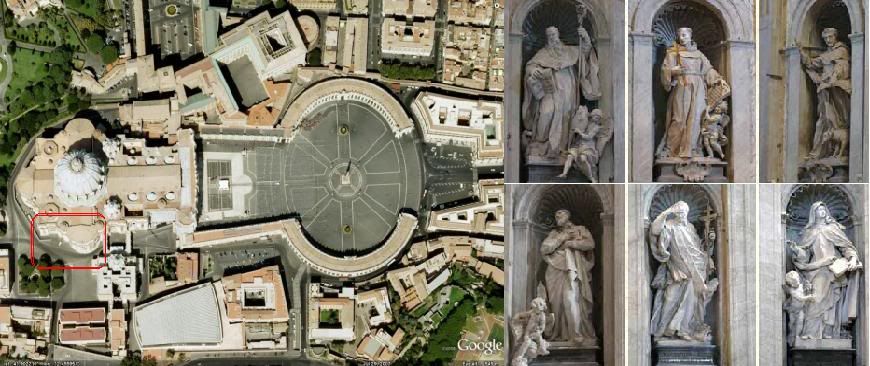 Left photo shows area where statues of saints who founded religious orders has been installed in external niches on the walls of St. Peter's Basilica;
Left photo shows area where statues of saints who founded religious orders has been installed in external niches on the walls of St. Peter's Basilica;
right panel shows 6 of the 35 Founder saints whose statues are in niches within the Basilica.
Saint Maron comes
to St. Peter's
 Below, left, Lebanese President Sleiman and his wife arrive for the ceremony.
Below, left, Lebanese President Sleiman and his wife arrive for the ceremony.
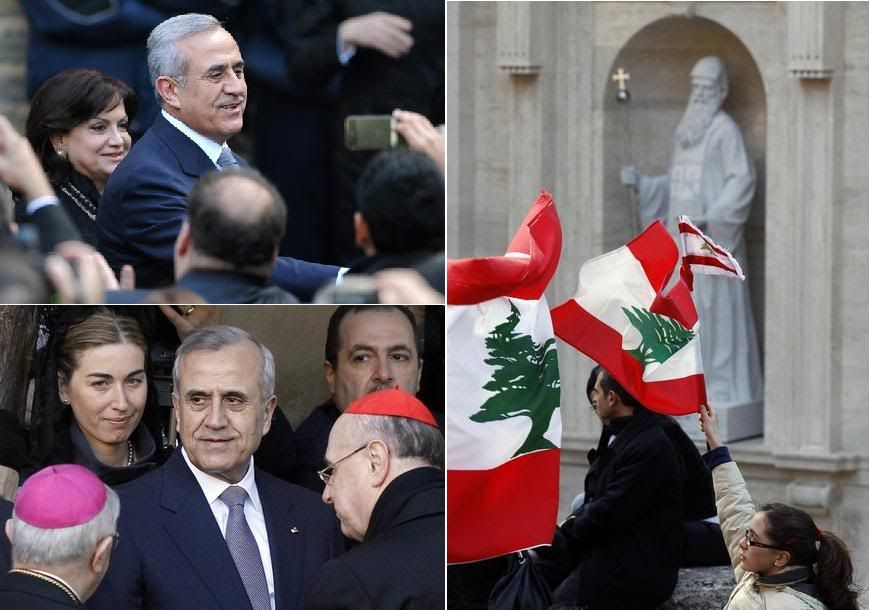
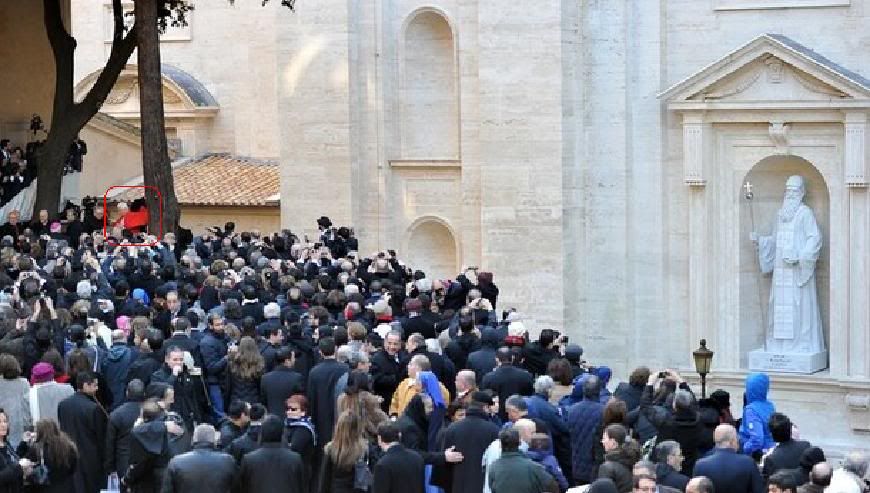
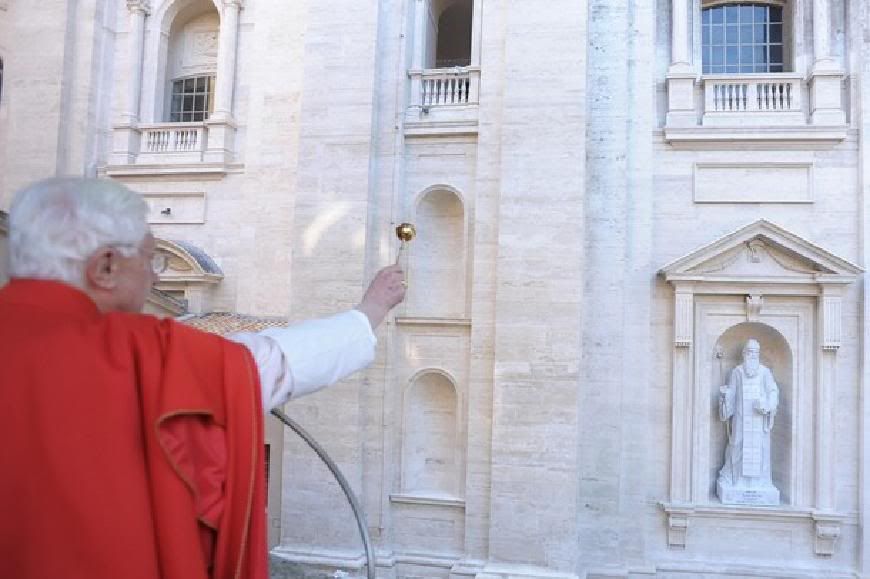
23 FEB 2011 (RV) - As the Maronite Church celebrates the sixteenth centennial of its founder Saint Maron, Pope Benedict on Wednesday called the faithful to look to the 5th century Syrian monk as an example to follow.
The Holy Father spoke at a brief ceremony when he unveiled and blessed a new statue of the saint placed in a niche along the exterior of St. Peter’s Basilica, before greeting pilgrims at the General Audience.
Among those attending the ceremony: The Holy See’s Secretary of State Cardinal Tarcisio Bertone, Maronite Patriarch Nasrallah Sfeir, Maronite Bishops, Lebanese President Michel Sleiman and a group of ministers representing all faiths, Ambassadors to the Holy See, and Maronite faithful from Lebanon and the Rome area. The Spanish sculptor Marco Augusto Dueñas who carved the sculpture out of Carrara marble, was also present.
In blessing the statue, the Holy Father prayed that the Lord would “give us the gift of announcing your Gospel unhesitatingly" – even to the extent of “giving one’s life.”
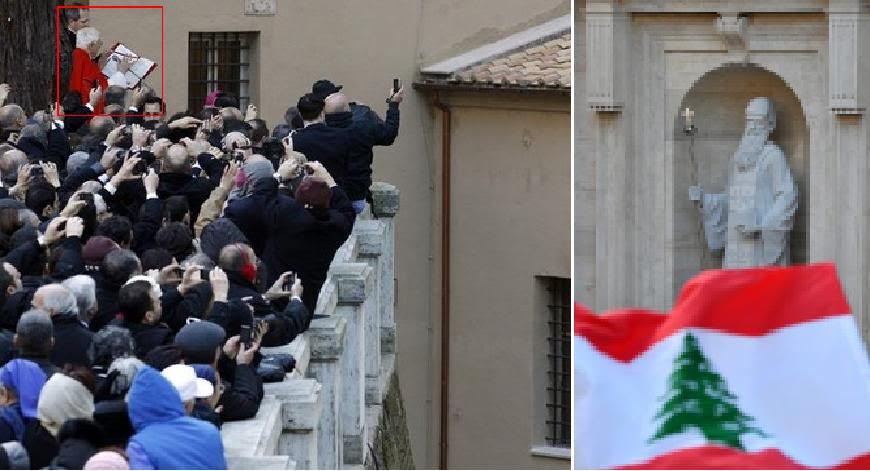
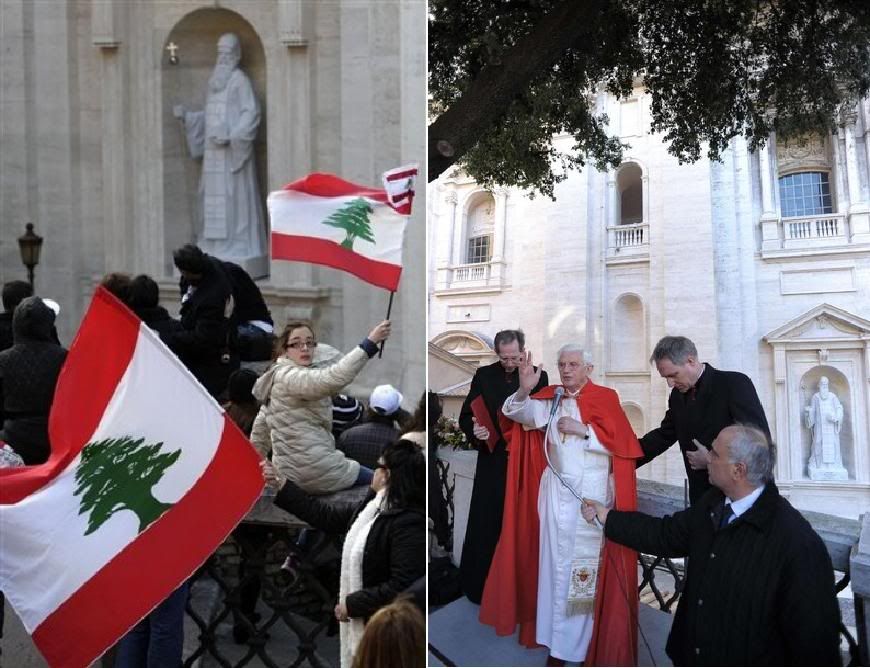
Tracey McClure spoke to one of the Maronite guests present at the unveiling. May Chidiac is the Lebanese television journalist who survived a car bomb in Jounieh, Lebanon, in September 2005 -just seven months after the assassination of Lebanon’s Prime Minister Rafik Hariri. She was widely known as an outspoken critic of Syria.
She explains her near-death experience led her to write “Heaven can wait for me,” a book in which she attributes her “miraculous” survival to the intervention of her guardian angels.
“It’s a nice book,” she says, “because angels were protecting me… I believe in miracles. Despite putting explosives under the seat in my car… I lost my leg and my left hand…in spite of all this I am still here after 33 surgeries.”
“I’m so happy to be here… we are the disciples of Saint Maron. We came especially from Lebanon to celebrate this very special occasion…to have the saint here beside all the (other) saints in the Vatican. It means a lot.”
“I think that it’s thanks to him maybe that there are still Christians in the Middle East.”
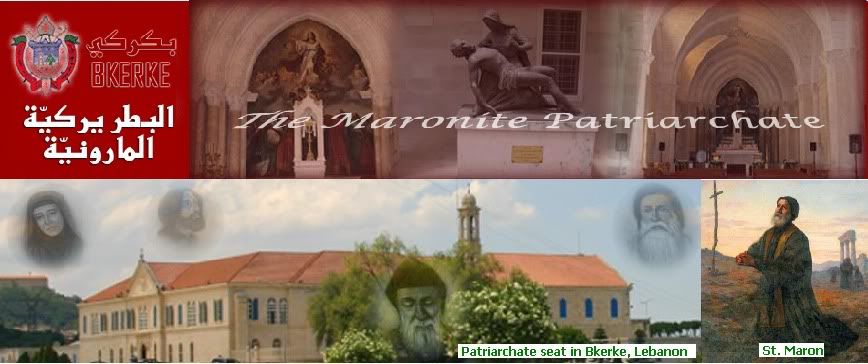 The monastic example, missionary work and miracles of the 5th-century Syrian monk-hermit Maron gave birth to the Maronite Catholic church after his death. The Maronites have a particularly important presence in Lebanon, where the Maronite Patriarchate has its seat in Bkerke.
The monastic example, missionary work and miracles of the 5th-century Syrian monk-hermit Maron gave birth to the Maronite Catholic church after his death. The Maronites have a particularly important presence in Lebanon, where the Maronite Patriarchate has its seat in Bkerke.
[Modificato da TERESA BENEDETTA 23/02/2011 21:56] |
| |
 23/02/2011 23:27 23/02/2011 23:27 |
|
| | | OFFLINE | | Post: 22.182
Post: 4.809 | Registrato il: 28/08/2005
Registrato il: 20/01/2009 | Administratore | Utente Master | |
|
 GENERAL AUDIENCE TODAY
GENERAL AUDIENCE TODAY
Catechesis on St. Robert Bellarmine
Doctor of the Church
The Holy Father today focused his catechesis on St. Robert Bellarmine, the fourth in the remaining eight Doctors of the Church that he had failed to cover in previous catechetical cycles covering outstanding figures of the Church from antiquity to the Middle Ages, which included the first 25 Doctors of the Church from St. Ambrose (340-397) to St Catherine of Siena (1347-1379).
To complete his catecheses on all 33 Doctors of the Church, he has since presented St. Teresa of Avila (1515-1582), St. Peter Canisius (1521-1597), St. John of the Cross (1542-1591), and today, St. Robert Bellarmine (1542-1621).
The remaining four are St. Lawrence of Brindisi (1559-1622), St. Francis de Sales (1567-1622), St. Alphonse Liguori (1696-1787), and St. Therese of Lisieux (1873-1897).
Here is how he synthesized the catechesis on St. Robert Bellarmine, after which he expressed his condolences for the earthquake victims and residents of Christchurch, New Zealand.
Our catechesis today deals with Saint Robert Bellarmine, the great Jesuit theologian and Doctor of the Church.
In the period following the Council of Trent, Saint Robert taught theology, first at Louvain and then in the Roman College. His most famous work, Controversiae, sought to address the issues raised by Protestant theology from a serene historical and theological perspective, but his most popular work remained his brief catechism of Christian doctrine.
He also served as spiritual father to the Jesuit students of the Roman College, including Saint Aloysius Gonzaga. Saint Robert was created a Cardinal by Pope Clement VIII, and made Archbishop of Capua, where he spent three years in preaching and pastoral activity before being recalled to Rome and the service of the Holy See.
In his later years, he composed a number of works of spirituality which reflect his deep Ignatian formation, with its stress on meditation on the mysteries of Christ and the loving imitation of the Lord.
May the example of Saint Robert Bellarmine inspire us to integrate our work and our pursuit of Christian holiness, to grow in closeness to God through prayer, and to contribute to the Church’s renewal through our own inner conversion to the Lord and the truth of his word.
A new and powerful earthquake, even more devastating than the one last September, has struck the city of Christchurch, in New Zealand, causing considerable loss of life and the disappearance of many people, to say nothing of the damage to buildings.
At this time, my thoughts turn especially to the people there who are being severely tested by this tragedy. Let us ask God to relieve their suffering and to support all who are involved in the rescue operations. I also ask you to join me in praying for all who have lost their lives.
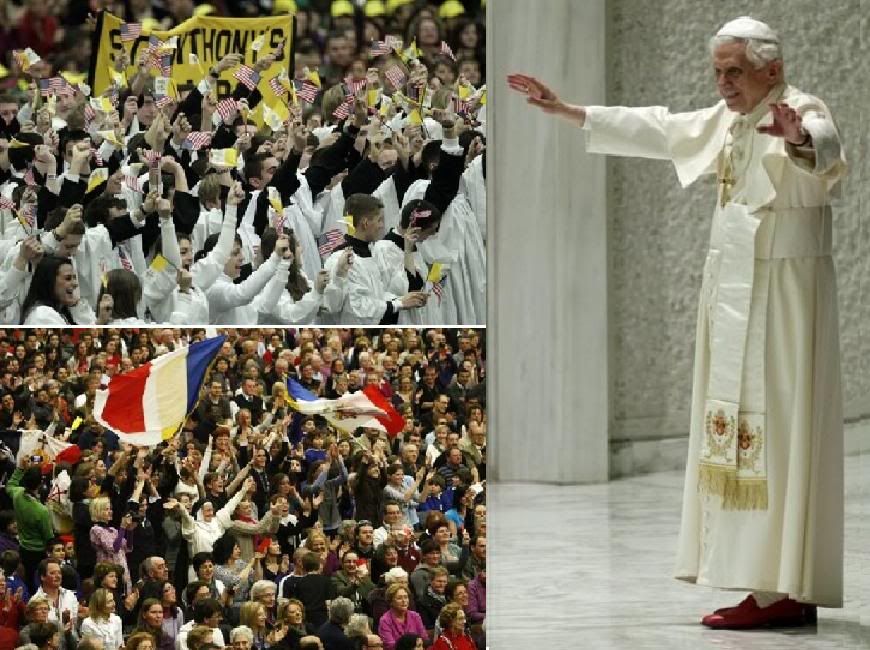
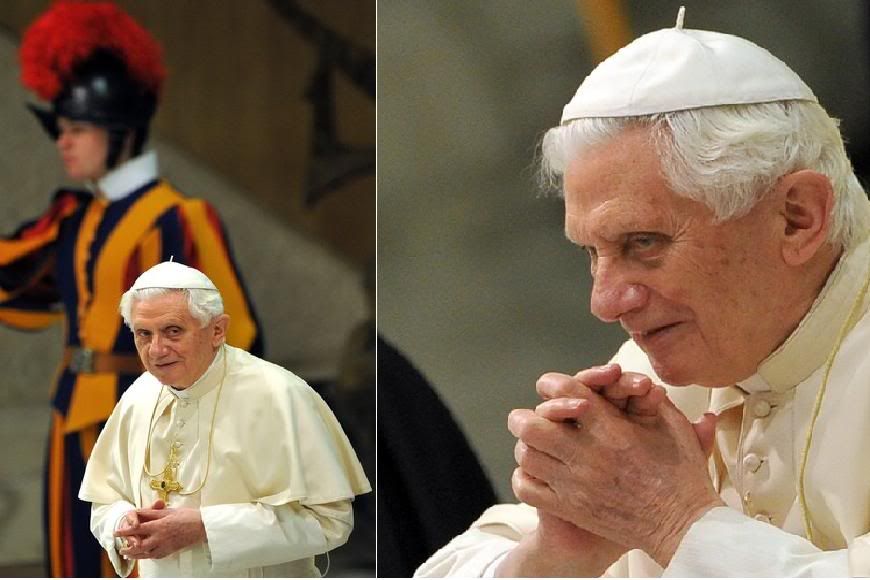 St. Robert Bellarmine and
St. Robert Bellarmine and
reforms in a time of crisis

23 FEB 2011 (RV) - Pope Benedict XVI continued his series on the great Doctors of the Church, turning this Wednesday to the 16th Jesuit theologian, Saint Robert Bellarmine, an outstanding figure of a troubled age in which "a serious political and religious crisis provoked a split between entire nations and the Holy See".
"His Disputationes (Controversies) are still a valid point of reference for Catholic ecclesiology", said the Holy Father. "They emphasise the institutional aspect of the Church, in response to the errors then circulating on that topic"
"Yet Bellarmine also threw light on invisible aspects of the Church such as Mystical Body, which he explained using the analogy of the body and soul, in order to describe the relationship between the interior richness of the Church and her visible exterior features.
"In this monumental work, which seeks to categorise the various theological controversies of the age, he avoids polemical and aggressive tones towards the ideas of the Reformation but, using the arguments of reason and of Church Tradition, clearly and effectively illustrates Catholic doctrine.
"Nonetheless", the Pope added, "his true heritage lies in the way in which he conceived his work. His burden of office did not, in fact, prevent him from striving daily after sanctity through faithfulness to the requirements of his condition as religious, priest and bishop...
"His preaching and catechesis reveal that same stamp of essentiality which he learned from his Jesuit education, being entirely focused on concentrating the power of the soul on the Lord Jesus, intensely known, loved and imitated"....
Before today's audience, the Holy Father blessed a statue of St. Maron, founder of the Maronite Church which is particularly widespread in Lebanon and Syria.
The 4.5-metre high Carrara-marble statue now occupies the last empty niche on the outside wall of St. Peter's Basilica, is the work of Spanish sculptor Marco Augusto Duenas.
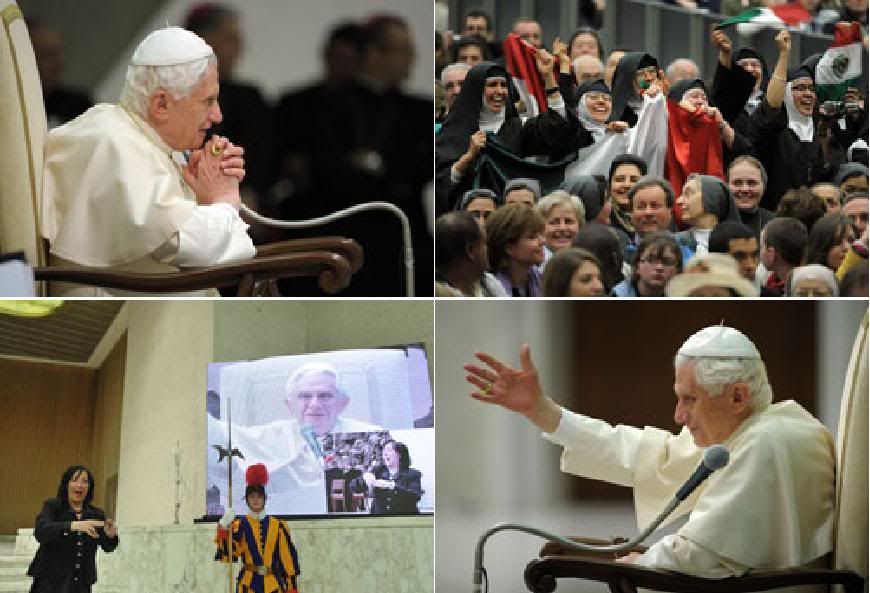 Here is a full translation of the catechesis:
Here is a full translation of the catechesis:
 Dear brothers and sisters,
Dear brothers and sisters,
St. Roberto Bellarmino, about whom I wish to speak to you today, brings us back to the time of a sad scission in Western Christianity, when a serious political and religious crisis provoked the detachment of entire nations from the Holy See.
Born on October 4, 1542, in Montepulciano, near Siena, he was a nephew, on his mother's side, of Pope Marcellus II. He had an excellent humanistic formation before entering the Society of Jesus on September 30, 1560.
His studies in philosophy and theology which he completed in the Collegio Romano, in Padua, and in Louvain, and which focused on St. Thomas Aquinas and the Fathers of the Church, were decisive for his theological orientation.
Ordained a priest on March 25, 1570, he was, for some years. a theology professor in Louvain. Subsequently, recalled to Rome to teach at the Collegio Romano, he was given the chair for Apologetics, In the decade that he had this position (1576-1586), he elaborated a course of lessons which later entered into Controversiae, a book which quickly became famous for its clarity and its wealth of contents, and its predominantly historical outlook.
The Council of Trent had just ended, and for the Catholic Church, it was necessary to reinforce and confirm her own identity especially with respect to the Protestant Reformation.
Bellarmino's activities were carried out in this context. From 1588 to 1694, he was first spiritual director of the Jesuit students in the Collegio Romano, among whom he met and guided the future St. Aloysius Gonzaga; then the religious superior.
Pope Clement VIII named him the pontifical theologian, consultor of the Holy Office, and rector of the College of Penitentiaries of St. Peter's Basilica. His catechism, the Dottrina cristiana breve, which was his most popular work, dates to this time.
On March 3, 1599, he was made a cardinal by pope Clement VIII, and on March 18, 1602, was named Archbishop of Capua. He received his episcopal ordination on April 21 that year.
During the three years that he was a diocesan bishop, he distinguished himself for his zeal as a preacher in his cathedral, for the visits that he made every week to his parishes, and for the three diocesan Synods and a provincial Council which he called.
After having participated in the conclaves that elected Pope Leo XI and Paul V, he was recalled to Rome, where he was a member of the Congregations of the Holy Office, the Index, Rites, Bishops, and Propagation of the Faith.
He also had diplomatic assignments to the Republic of Venice and to England, in defense of the rights of the Apostolic See.
In his final years, he wrote several books pf spirituality in which he condensed the fruits of his own annual spiritual exercises. Reading these, Christians even today can find them greatly edifying.
He died in Rome on Sept. 17, 1621. Pope Pius XI beatified him in 1923, canonized him in 1930, and proclaimed him Doctor of the Church in 1931.
San Roberto Bellarmino played an important role in the Church during the last decades of the 15th century and the early part of the following century. His Controversiae constituted a reference point that is still valid for Catholic ecclesiology on questions regarding Revelation, the nature of the Church, the Sacraments, and theological anthropology.
His work appears to emphasize the institutional aspect of the Church, in view of the errors which circulated at the time on such questions. Nonetheless, Bellarmino also clarified the invisible aspects of the Church as the Mystical Body and he illustrated these by an analogy to body and soul, to describe the relationship between the internal riches of the Church and the external aspects that make her perceptible.
In this monumental work, which attempted to systematize the various theological controversies of the era, he avoided every polemical and aggressive stand regarding the ideas of the Reformation, but using the arguments of reason and the Tradition of the Church, he illustrated Catholic doctrine in a clear and effective way.
However, his legacy lies mainly in the way he conceived of his work. The heavy demands of office did not, in fact, prevent him from tending daily to holiness with his fidelity to the demands of his own status as a religious, priest, and bishop.
From this fidelity arose his commitment to preaching. Being, as priest and bishop, first of all, a pastor of souls, he felt it was his duty to preach assiduously. There are hundreds of such sermones - homilies - in Flanders, in Rome, in Naples and in Capua, on the occasion of liturgical celebrations.
No less abundant are his expositiones and explanatione to parish priests, religious, students of the Collegio Romano, that often were on Sacred Scripture, especially the Letters of St. Paul. His preaching and catechesis present the same trait of essentialness which he had learned from his Ignatian education, which concentrates all the forces of the soul on the Lord Jesus, intensely known, loved and imitated.
In the writings of this man of governance, one is very clearly aware, despite the reserve behind which he masks his sentiments, of the primacy that he gives to the teachings of Christ.
Thus, San Bellarmino offers a model of prayer, the soul of every activity: prayer that listens to the Word of the Lord, which becomes mute in the contemplation of his grandeur, not folded in on the self, but ready to abandon oneself to God.
A distinctive sign of Bellarmino's spirituality was his living and personal perception of the immense goodness of God, in whom our saint felt himself truly a beloved child of God. For him, ti was a source of great joy to recollect himself, with serenity and simplicity, in prayer, in the contemplation of God.
In his book De ascensione mentis in Deum (Elevating the mind to God) composed following the scheme of St. Bonaventure's Itinerarium, he exclaims: "O my soul, your model is God, infinite beauty, light without shadows, splendorr that surpasses that of the moon and the sun: Raise your eyes to God in whom the archetype of all things is found, and from whom, as from a spring of infinite fruitfulness, comes the near infinity of things. And so you must conclude: whoever finds God, finds everything; who loses God, loses everything".
In this text one hears the echo of the famous contemplatio ad amorem obtineundum – contemplation to obtain love - from the Spiritual Exercises of St. Ignacio de Loyola. Bellarmino, who lived in the sumptuous and often unhealthy society of the late 16th and early 17th centuries, obtained from such contemplation practical applications to project the situation of the Church of his time with lively pastoral inspiration.
In the book De arte bene moriendi (The art of dying well), for instance, he cites as a sure standard for living well, as for dying well, frequent and serious meditation in which one must render an account to God of one's actions and one's way of living, and strive not to accummulate riches on earth, but to live simply and with charity, in order to accumulate goods in heaven.
In the book De gemitu columbae (The dove's lament), in which the dove represents the Church, he forcefully calls on the clergy and the faithful to a concrete and personal reform of their own life following what Scriptures and the saints teach - among whom he particularly cites St. Gregory Nazianzene, St, John Chrysostom, St. Jerome and St. Augustine, besides the great founders of religious orders like St. Benedict, St. Dominic and St. Francis.
Bellarmino taught with great clarity and with the example of his own life that there cannot be a true reform in the Church without, first, our personal reform and the conversion of our heart.
Bellarmino drew from St. Ignacio's Spiritual Exercises, advice on how to communicate profoundly even to the most simple minds, the beauty of the mysteries of the faith.
He wrote: "If you are wise, you will understand that you were created for the glory of God and for your eternal salvation. This is your destiny, this is the center of your soul, this is the treasure of your heart. Therefore, consider it a true good for yourself that which leads you to your goal, and as true evil that which makes you miss it.
"Prosperous and adverse events; wealth and poverty, sickness and health, honors and insults, life and death, the wise man should neither seek them nor flee them for what they are. But things are good and desirable only if they contribute to the glory of God and to your eternal happiness; they are bad and to flee from if they are in the way (De ascensione mentis in Deum, grad. 1).
Thsee are obviously not words which have gone out of fashion, but to be meditated on at length even today in order to orient our journey on this earth. They remind us that the end of our life is the Lord, God who revealed himself in Jesus Christ, in whom he continues to call us and to promise us communion with him.
They remind us of the importance of trusting the Lord, of giving one's all in a life faithful to the Gospel, of accepting and illuminating with faith and with prayer every circumstance and every activity of our life, always reaching out towarrds union with him. Thank you.;/DIM]
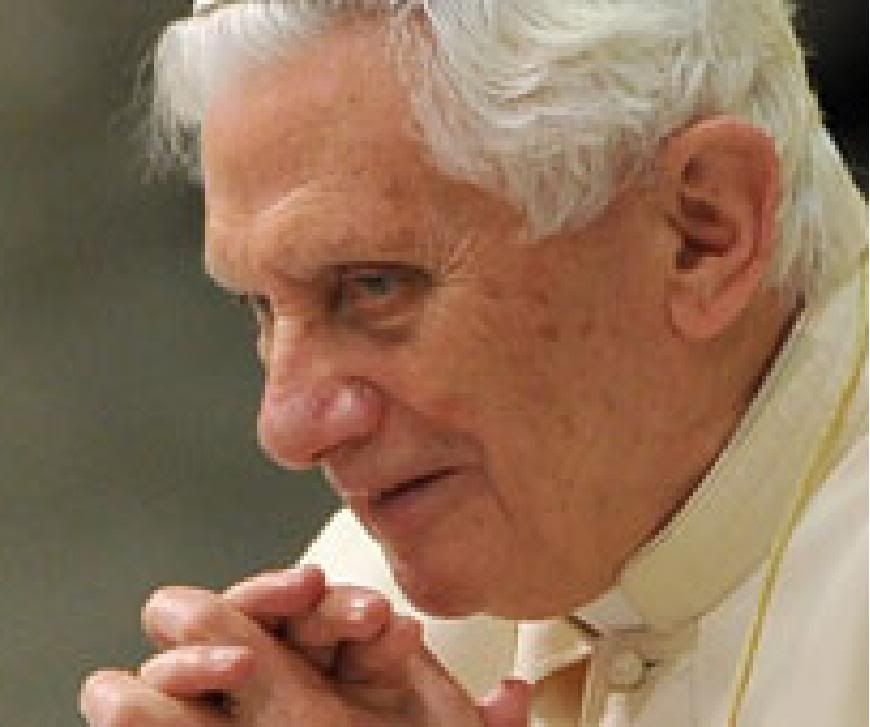
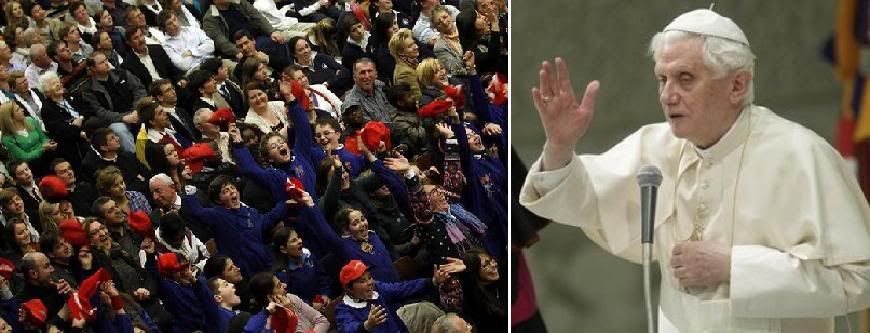
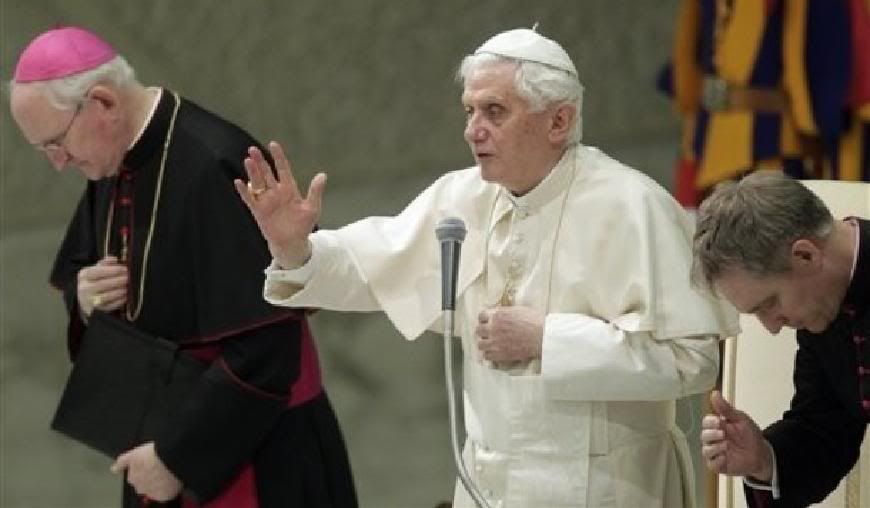
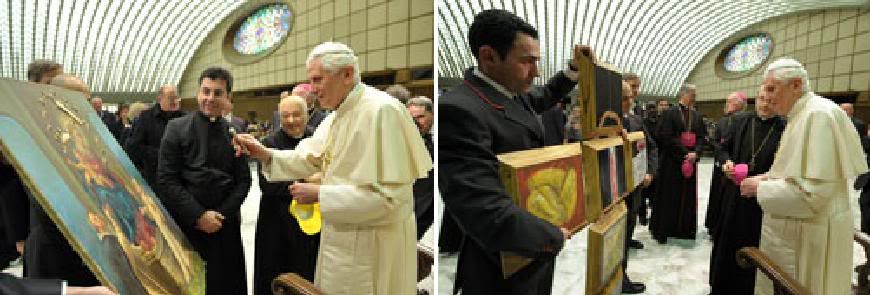
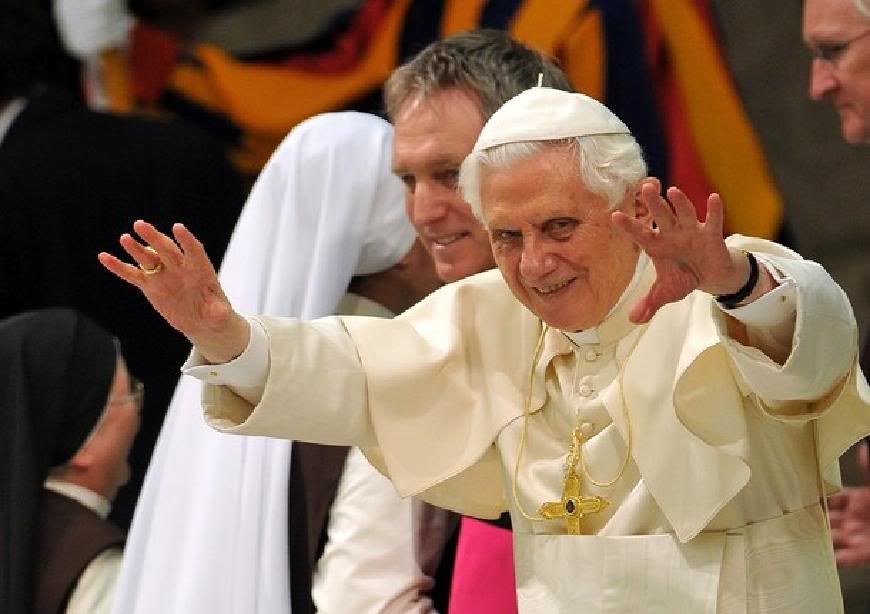
[Modificato da TERESA BENEDETTA 24/02/2011 17:52] |
| |
 24/02/2011 13:26 24/02/2011 13:26 |
|
| | | OFFLINE | | Post: 22.183
Post: 4.810 | Registrato il: 28/08/2005
Registrato il: 20/01/2009 | Administratore | Utente Master | |
|

 Obama opens floodgates
Obama opens floodgates
to same-sex 'marriage
There having been no other significant news or commentary about the Pope yesterday, let me interject into this thread what I consider the most outrageous news from the Obama administration late yesterday [more outrageous even than the fact that he waited days before making a public comment on the Libya situation (he finally did yesterday) without mentioning Qaddafi at all, in what many observers thought to be a downright wimpy statement in view of the apparent genocide ordered by Qaddafi on those who are calling for him to step down].... I have to check back but did Obama not tell the Pope in June 2009 that he would uphold the Defense of Marriage Act???
Obama administration drops
defense of traditional marriage

February 23, 2011
The Obama administration will no longer defend the Defense of Marriage Act (DOMA), which defines marriage as a relationship between a man and a woman, Attorney General Eric Holder has announced.
The Justice Department traditionally defends all federal laws against court challenges. But Holder said that if no "reasonable" defense is available, his department does not offer such defense. In the case of the DOMA law, he said, no "reasonable" defense is possible.
In his February 23 announcement, Holder said that President Obama had changed his views on DOMA, and "concluded that given a number of factors, including a documented history of discrimination, classifications based on sexual orientation should be subject to a more heightened standard of scrutiny."
He said that the President concluded the DOMA legislation "fails to meet that standard and is therefore unconstitutional."
[Since when has the President of the United States and his Justice Department taken it on themselves to declare a law 'unconstitutional' - it is for the Supreme Court alone to determine that. The executive branch may have its opinion, as they do in this, but until the law is repealed or judicially struck down, the Justice Department is obliged to defend it!]
Although the administration believes the law to be unconstitutional, Holder said, the executive branch will continue to enforce the law until it is repealed by Congress or overturned by the courts. [ And how can they enforce it plausibly if they have already told the public they think it is unconstitutional?????]
![[SM=g8126]](https://im0.freeforumzone.it/up/0/26/3169140.gif) ![[SM=g8126]](https://im0.freeforumzone.it/up/0/26/3169140.gif) ![[SM=g8126]](https://im0.freeforumzone.it/up/0/26/3169140.gif) ![[SM=g8126]](https://im0.freeforumzone.it/up/0/26/3169140.gif) ![[SM=g8126]](https://im0.freeforumzone.it/up/0/26/3169140.gif) ![[SM=g8126]](https://im0.freeforumzone.it/up/0/26/3169140.gif) ![[SM=g8126]](https://im0.freeforumzone.it/up/0/26/3169140.gif) ![[SM=g8126]](https://im0.freeforumzone.it/up/0/26/3169140.gif) ![[SM=g8126]](https://im0.freeforumzone.it/up/0/26/3169140.gif) ![[SM=g8126]](https://im0.freeforumzone.it/up/0/26/3169140.gif) ![[SM=g8126]](https://im0.freeforumzone.it/up/0/26/3169140.gif) ![[SM=g8126]](https://im0.freeforumzone.it/up/0/26/3169140.gif) ![[SM=g8126]](https://im0.freeforumzone.it/up/0/26/3169140.gif) ![[SM=g8126]](https://im0.freeforumzone.it/up/0/26/3169140.gif) ![[SM=g8126]](https://im0.freeforumzone.it/up/0/26/3169140.gif) ![[SM=g8126]](https://im0.freeforumzone.it/up/0/26/3169140.gif)
[Modificato da TERESA BENEDETTA 24/02/2011 18:03] |
| |
 24/02/2011 15:10 24/02/2011 15:10 |
|
| | | OFFLINE | | Post: 22.184
Post: 4.811 | Registrato il: 28/08/2005
Registrato il: 20/01/2009 | Administratore | Utente Master | |
|
 Thursday, February 24, Seventh Week in Ordinary Time
Thursday, February 24, Seventh Week in Ordinary Time
 Illustrations include the Belludi chapel in Padua; Luca invoking St. Anthony's intercession; and the saint and his disciple.
BLESSED LUCA BELLUDI (Italy, 1200-1285)
Illustrations include the Belludi chapel in Padua; Luca invoking St. Anthony's intercession; and the saint and his disciple.
BLESSED LUCA BELLUDI (Italy, 1200-1285)
Franciscan priest, Disciple and Companion of St. Anthony of Padua
Tradition says that Luca, a young noble student at the University of Padua, walked up to Anthony after
hearing him preach and asked to join the Franciscans, and that Anthony was so impressed by him that
he eventually had him ordained by St. Francis himself. In any case, he became Anthony's devoted
companion in his travels and preaching for the rest of his life. After Anthony died, Luca was named
to succeed him as head of the Franciscans in Padua and he started to build the basilica in his honor. But
a local tyrant took over Padua and Luca was exiled. He is said to have asked for Anthony's intercession
to liberate the city. He came back to continue building the basilica, founded other monasteries and carried
on St. Anthony's work for another 30 years. He was credited with working miracles like Anthony did, and
when he died, he was buried in the same tomb as Anthony. His remains were separated only in 1971, and
are now kept in the Belludi chapel of the Basilica in Padua. An inscription said of him: “Disciple and
companion of St. Anthony, he was a truly learned man, most excellent of preachers, and in his teaching
and life little different from his master". Always called 'Beato Luca' since his death, he was not formally
beatified until 1927.
Readings for today's Mass: www.usccb.org/nab/readings/022411.shtml
OR today.
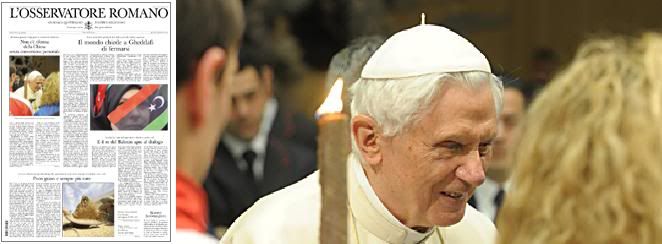
At the General Audience, the Pope cites St. Robert Bellarmine:
'There can be no reform in the Church
unless there is personal reform first'
Other stories on page 1: International leaders call on Libya's Qaddafi to stop killing protesters against his regime; continuing updates on Arab unrest, as the King of Bahrain says he is open to dialog; another story on the worldwide shortage in grain production this year, driving prices up further. In the inside pages, a very belated report on the Sunday penitential Mass in Dublin with victims of priestly sex abuse (hard to explain why it took the OR four days to report on this!); and a feature about the late Italian priest Francisco Bertoglio, who as rector of the Pontifical Lombard Seminary in Rome during World War II, hid 80 Jews in the seminary under Pius XII's orders to all reliigous institutions at the time, and who was declared by the Yad Vashem Holocaust memorial in Jerusalem last June as a 'Righteous among the Nations', Israel's supreme honor for all non-Jews who rescued or saved at least one Jew during World War II. Bergoglio's seminary was raided and he and his wars were all taken to Nazi headquarters, but he managed to talk his way out of the jam and subsequently placed all his Jewish wards in other religious institutions in Rome.
Bergoglio's wartime heroism is told in a new book entitled Il Papa lo vuole: Le direttive di Pio XII e gli ebrei romani salvati dal Pontificio Seminario Lombardo (The Pope wished it so: The directives of Pius XII and the Pontifical Lombard Seminary). (I underscore this item because it clearly shows the hypocrisy of the State of Israel in its patently unjust persecution of Pius XII, whose actions saved thousands of Jewish lives in amply documented ways. Of course, they are right to honor Father Bergoglio, but for more reason, Pius XII should have been among the very first of the 'Righteous among Nations' to be proclaimed by them, alongside icons like Raoul Wallenberg and Oskar Schindler!]
PAPAL EVENTS TODAY
The Holy Father met with
- H.E. Michel Sleiman, President of the Republic of Lebanon, with his wife and delegation
- Seven bishops from the Philippines (northern region, Group 1) on ad limina visit. Individual meetings.

The Holy Father has accepted the resignation of Cardinal Georg Maximilian Sterzinsky as Archbishop of Berlin
for having reached canonical retirement age.
At the same time, he has named Mons. Franz-Josef Overbeck, Bishop of Essen, to the Military Ordinary for
the Federal Republic of Germany.
 A few items of interest earlier this week that deserve mention and later postings, perhaps:
A few items of interest earlier this week that deserve mention and later postings, perhaps:
- Father Z writes about an American 'priestette' who has seen the error of her ways (I believe she's the first one to do so).
- The married Lutheran minister whom Cardinal Meisner of Cologne ordained last weekend as a Catholic priest, and whose wife is now a Caremlite nun.
- An Anglo-Catholic Lutheran church in the US seeking to join an Ordinariate (I did not even realize there was such a denomination!).
- Canon lawyer Ed Peters getting bombarded by some leftist Catholics in the US media for having said that under the Code of Canon Law, the divorced Catholic Governor of New York, Andrew Cuomo, should not be given Communion (and should not seek Communion) since he is living in open concubinage with his girl friend. Cuomo has replied his faith is 'a private matter' - but communion is a public act that, in Cuomo's case, does cause 'public scandal' for the Catholic faithful.
- An assessment of the ultra-liberal Cardinal Mahony of Los Angeles as he prepares to retire, and the prospects under his successor, Archbishop Jose Gomez, named Coadjutor Archbishop by the Pope last year to be in place for the succession.
[Modificato da TERESA BENEDETTA 24/02/2011 18:01] |
| |
 24/02/2011 16:26 24/02/2011 16:26 |
|
| | | OFFLINE | Post: 370
Post: 93 | Registrato il: 28/05/2007
Registrato il: 19/02/2009 | Utente Comunità | Utente Junior | |
|
Is there some prospects of a serious rep. candidate for the next presidential election!!
Obviously Mrs. Palin is out of the picture (if you ask me).
I imagine this will be overturned by somebody who's not sold out to the homo/gender/feminist lobby.
 The Defense of Marriage Act is the existing law, and even if the present Congress acts to repeal it (I think there would be enough decent Democrats who will vote for repeal), Obama will veto their repeal. So someone would have to raise the issue to the Supreme Court, but then, it would be the duty of the Department of Justice to defend it, which it just said it won't - and the process may take more than the less than 2 years now left in Obama's term.
The Defense of Marriage Act is the existing law, and even if the present Congress acts to repeal it (I think there would be enough decent Democrats who will vote for repeal), Obama will veto their repeal. So someone would have to raise the issue to the Supreme Court, but then, it would be the duty of the Department of Justice to defend it, which it just said it won't - and the process may take more than the less than 2 years now left in Obama's term.
So yes, we'll have to wait for a Republican President to restore some good, solid, traditional values to US leadership, if not to all of American society. I am amazed - and thank God daily - that the most prominent Republican leaders continue to stand firm for traditional social, constitutional and fiscal values, in a society where the most strident voices are ultra-liberal and anti-tradition, and the Demcorats have become uncompromisingly and radically secular, in the worst sense of the word.
However, there is no real Republican front-runner right now. Republicans know they have to nominate someone whose primary qualification is that he can beat Obama. For now, it's not Sarah Palin - although she has been most unfairly demeaned by those who dislike her and everything she stands for, and treat her as if she were a moron which she decidedly is not.
[All you have to do is listen to Palin state her positions and listen to a comparable soundbite from Hillary Clinton (on US TV, it is possible to listen to many such soundbites on cable news throughout the day): one is very fluid and straight-talking. and quick with the certainty of her positions; the other is full of 'Ummm..." and 'Errr...' despite all her years as senator and Secretary of State, and is incapable of speaking other than with the platitudes of fence-straddling and political correctness.]
Palin is as polarizing right now as Hillary was before Monica Lewinsky earned her all that sympathy for having been the wronged woman Even if Palin were nominated, unlikely for now, she would immediately be branded 'unelectable' by all her opponents and the Democrats, who have so far managed to impose their views on those who are not Palin admirers to begin with and could easily make 'unelectable' a self-fulfilling prophecy.
Mitt Romney seems genuinely decent and competent, with excellent economic credentials, plus he has money of his own and an existing political support team, but whether Republicans will see him as capable of beating Obama next year depends on how the economy does between now and summer of 2012 when the parties choose their nominees. Chris Christie, the Catholic governor of New Jersey for the past two years, is high among the polling favorites right now because of his courage in tackling his state's financial problems, but it may be premature for him.
Newt Gingrich and Mike Huckabee are both intelligent, with proven competence at governing, but Gingrish, recently turned Catholic, has many personal negatives; and Huckabee, eminently likable, chock-full of common sense and solid religious values. as well as very quick-witted, just hasn't seemed to attract financial support so far, though he and Romney alternate in winning most mainstream Republican polls these days.
However, whoever ends up being the Republican candidate against Obama - unless it's some dark horse we haven't been paying attention to - will almost certainly stand up for right to life, traditional marriage and family values.
TERESA
[Modificato da TERESA BENEDETTA 24/02/2011 20:10] |
| |
 24/02/2011 17:48 24/02/2011 17:48 |
|
| | | OFFLINE | | Post: 22.186
Post: 4.813 | Registrato il: 28/08/2005
Registrato il: 20/01/2009 | Administratore | Utente Master | |
|
 Europols should listen to Pope,
Europols should listen to Pope,
says EU Parliament President

BRUSSELS, Feb. 24 (SIR) - “We politicians in Europe should listen to what a man of faith and culture like Joseph Ratzinger has to say. He is not just a head of state; he is first of all the supreme Pontiff of the Catholic Church: a community of believers who have shaped Europe”.
Jerzy Buzek (Polish), first a militant in Solidarnosc against the regime, then prime minister in Warsaw from 1997 to 2001, and now president of the European Parliament, will meet Pope Benedict at the Vatican on Monday 28 February. SIR Europa interviewed him in Brussels.
“At a time of great changes in Europe and in the world – he said -, we all need some directions. The East and the West are finally growing hand in hand. We, in Europe, have started to breathe with two lungs again as the great John Paul II had asked”, the president of the European Parliament said.
“I know that one of the greatest concerns of the Catholic Church these days is probably the persecution of Christians in the Middle East. This is a concern that we all share here, at the European Parliament, and we are calling on Catherine Ashton, the High Representative of the European Union for Foreign Affairs, to take concrete measures for the protection of religious freedom.
“European integration has always had two dimensions: bringing nations together in a single Union and supporting each citizen in finding their place in a globalised society”, Buzek said.
“Let us consider, for instance, the global challenge of migration, the European challenge of the aging of societies, and the local challenge of disintegrating communities. These challenges are all inter-related”.
Focusing on current problems, he added:
“Migration to Europe is a matter of fact and is expected to increase in the years to come. We should find a European answer to this problem...
“The events in Libya, Tunisia, Egypt, and across the Arab world are a source of hope. From the very beginning, I have supported the legitimate aspirations of the peoples. As neighbours, friends and partners, we must protect the flowers of freedom”.
As for families, Buzek says: “They are the very heart of the entire human society. We should protect and care for them”.
Finally a message to the young: “Keep confident about the good we can do. Do not lose the hope that this can be achieved. You are Europe and Europe needs your support”.
|
| |
 24/02/2011 23:08 24/02/2011 23:08 |
|
| | | OFFLINE | | Post: 22.187
Post: 4.814 | Registrato il: 28/08/2005
Registrato il: 20/01/2009 | Administratore | Utente Master | |
|
 Pope discusses Iraqi Christians
Pope discusses Iraqi Christians
with Kurdish delegation

VATICAN CITY, Feb. 24 (UPI) -- Pope Benedict XVI praised visiting delegates from the Kurdish north of Iraq for promoting religious tolerance in the region, the Kurdish government said.
Kurdish President Massoud Barzani met Thursday with the Pope in Vatican City. Barzani carried with him information on the status of the minority Christian community in Iraq.
"Pope Benedict XVI expressed his gratitude to the president and the Kurdistan Regional Government for their support for the Christian community in Iraq, and commended his leadership in promoting peaceful coexistence and religious tolerance in Iraq," a statement from the KRG read.
Violence targeting the Iraqi Christian population, traditionally based in the north, displaced as much as half of the ethnic minority community in 2008. An al-Qaida attack on a Christian church in Baghdad in October killed at least 60 people and left nearly 100 severely injured.
Catholic leaders in Baghdad, meanwhile, said that despite pledges from top Iraqi government officials that security would improve, Christians are afraid and are leaving the country.
There were around 1.4 million Christians living in Iraq before the U.S.-led invasion in 2003. Conservative estimates report that half that number remains in the country.
The statement from the Kurdish government said 10,000 Christian families have fled the violence since 2003.
The meeting with the Kurdish delegation was not listed in the daily Vatican bulletin for today, one assumes it could have taken place yesterday, after the General Audience, which is usually an occasion for the pope to meet briefly with some delegations. Back in the 1960s-1970s, UPI was the major competitor to AP as the world's leading Anglophone news agency, but for some reason, it fell back and has remained very much behind AP since then.
|
| |
 25/02/2011 03:32 25/02/2011 03:32 |
|
| | | OFFLINE | | Post: 22.188
Post: 4.815 | Registrato il: 28/08/2005
Registrato il: 20/01/2009 | Administratore | Utente Master | |
|
 Pope Benedict receives
Pope Benedict receives
the President of Lebanon

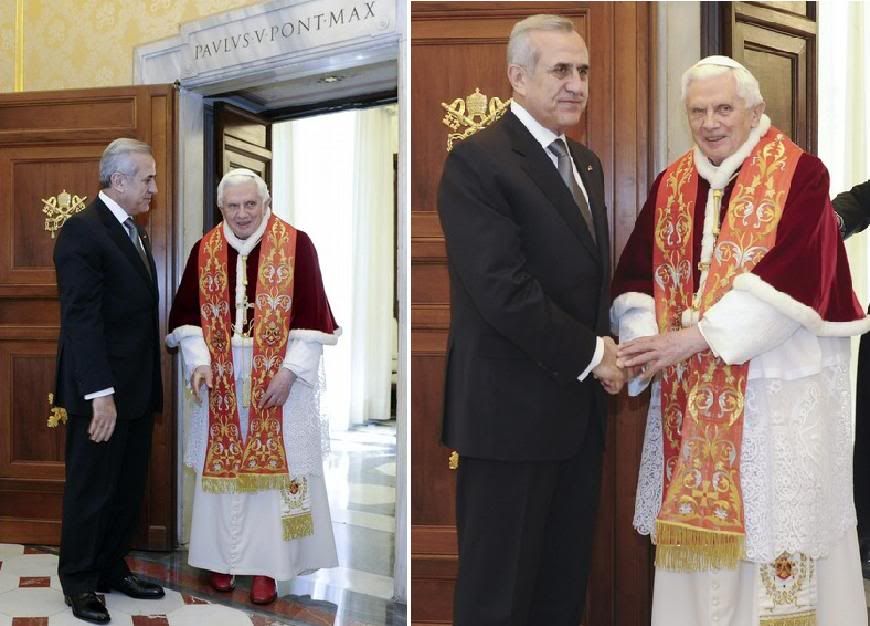
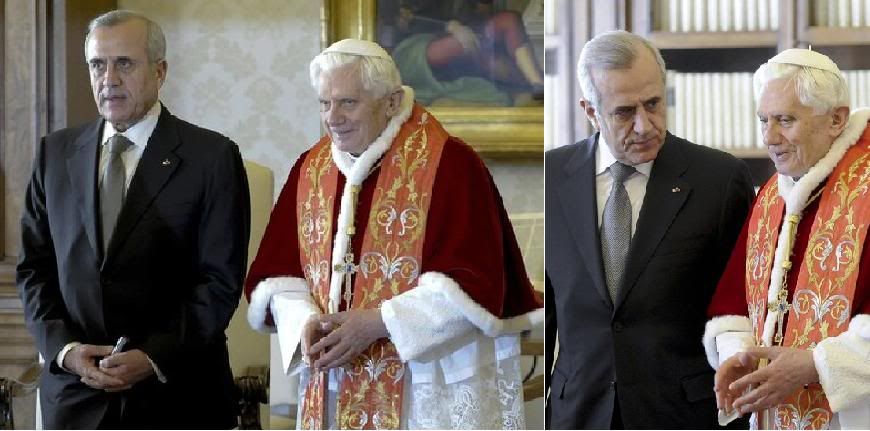
23 FEB 2011 (RV) - Lebanon, “because of the presence of various Christian and Muslim communities there, stands as a message of freedom and respectful coexistence, not only for the region but for the whole world. In this context, it is increasingly necessary to promote collaboration and dialogue between religious confessions”.
Echoing the words of John Paul II, the opening line of the Vatican communiqué on Thursday morning’s meeting between Pope Benedict XVI and Lebanese President Michel Suleiman,echoed words from John Paul II to underscores the regional importance of the Land of the Ceders.
Pope Benedict XVI welcomed the Head of State at the door of his private library. After posing for photographs, the two men then retired for a 30 minute private conversation, held in French.
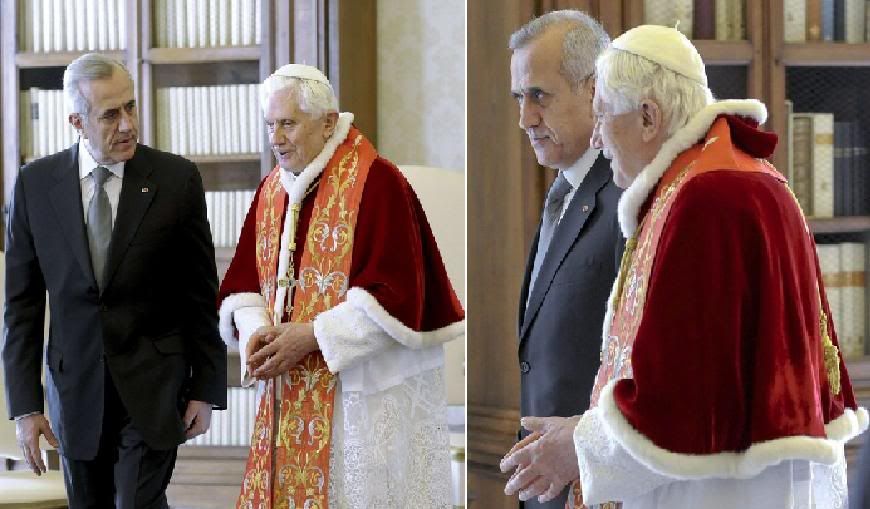
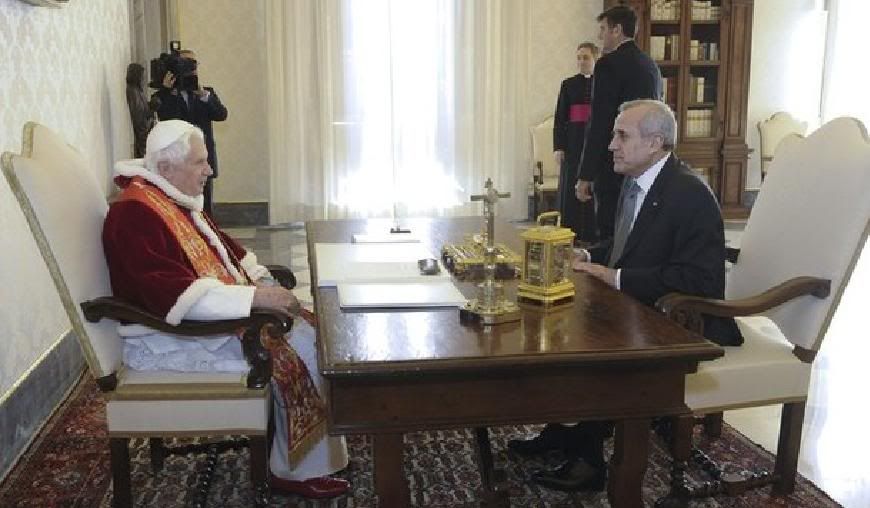
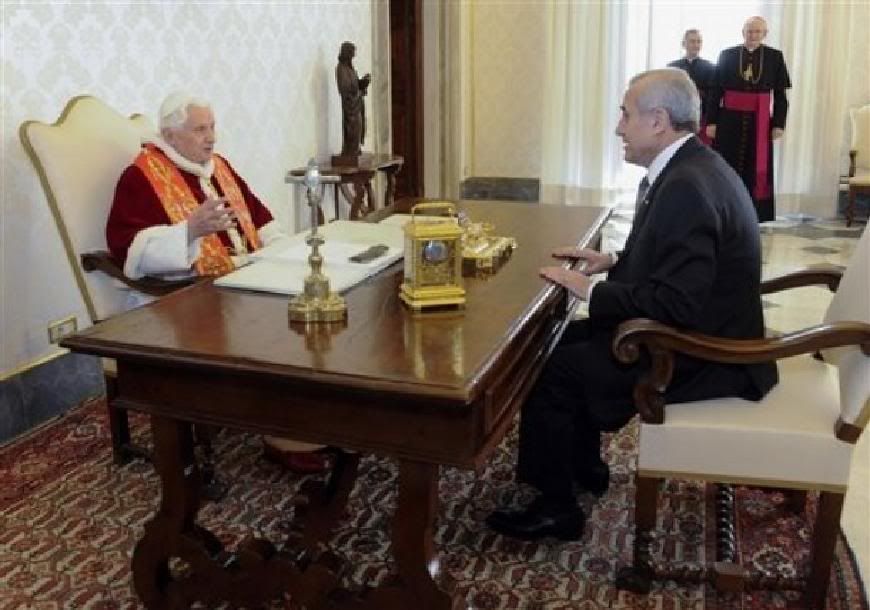
On emerging, the President presented his wife, son and delegation to the Holy Father and gifted him a beautifully crafted gold and ivory censer dating to the seventeenth century, from a Lebanese monastery.
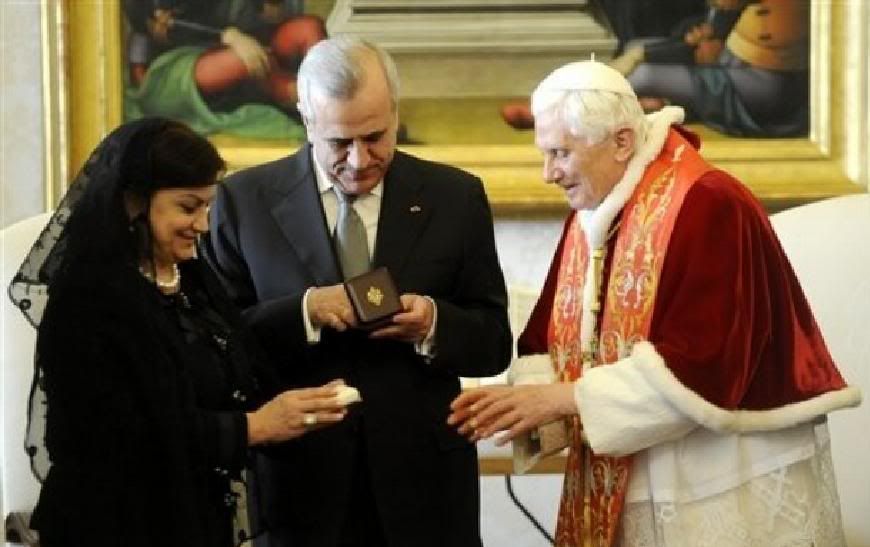
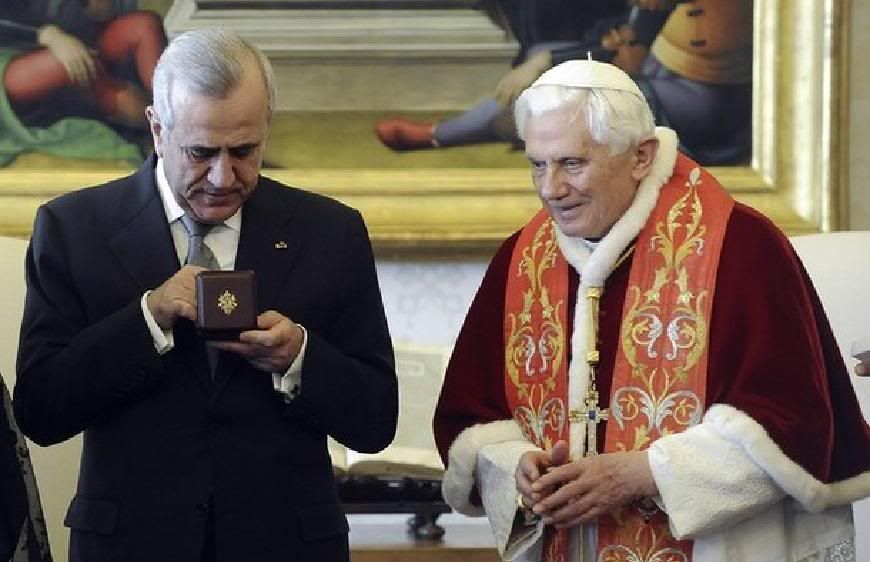
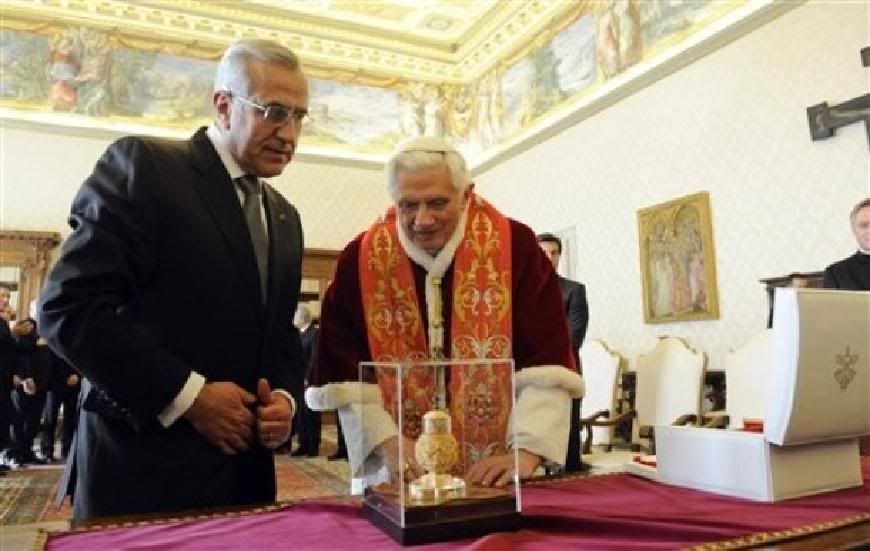
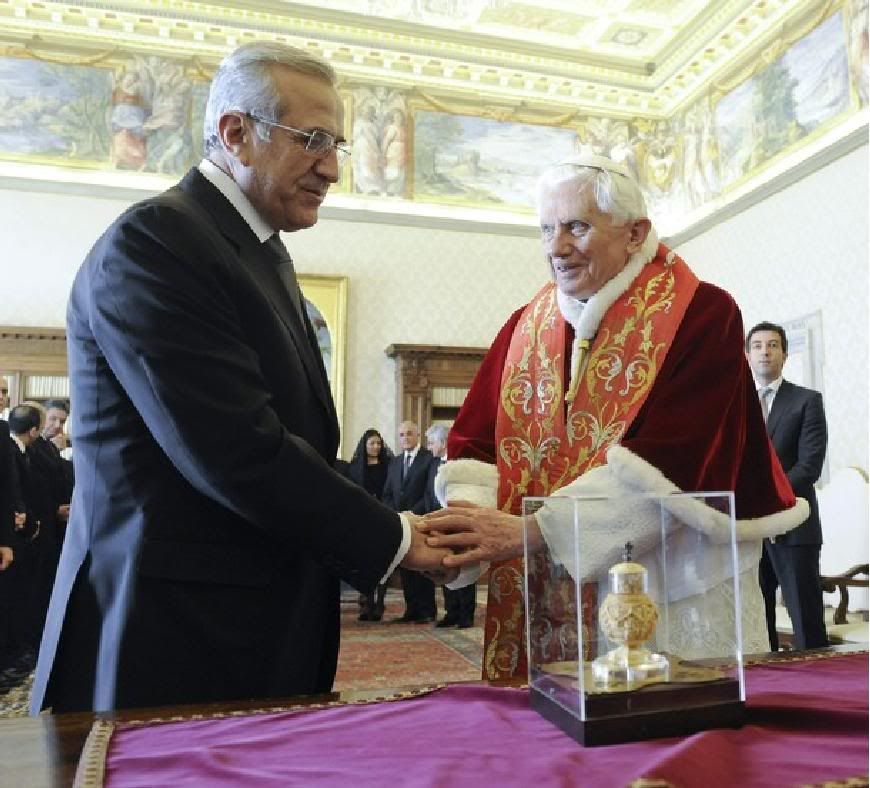
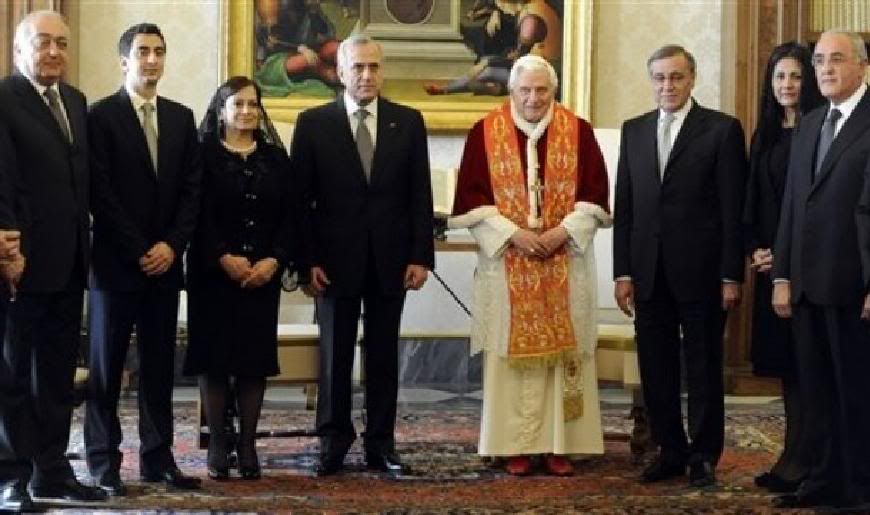
A statement released shortly after the encounter read; “Attention ...turned to the importance of civil and religious authorities being committed to educating consciences in peace and reconciliation, and the hope was expressed that the formation of the new government may favour the desired stability of the nation, which is called to face important internal and international challenges”.
“The talks then dwelt on the situation in the Middle East, with particular reference to recent events in certain Arab States, with the parties expressing their shared conviction that it is vital
to resolve the ongoing conflicts in the region”.
“Finally, particular attention was given to the delicate situation of Christians in the entire region, and to the contribution they can make for the good of society as a whole”.
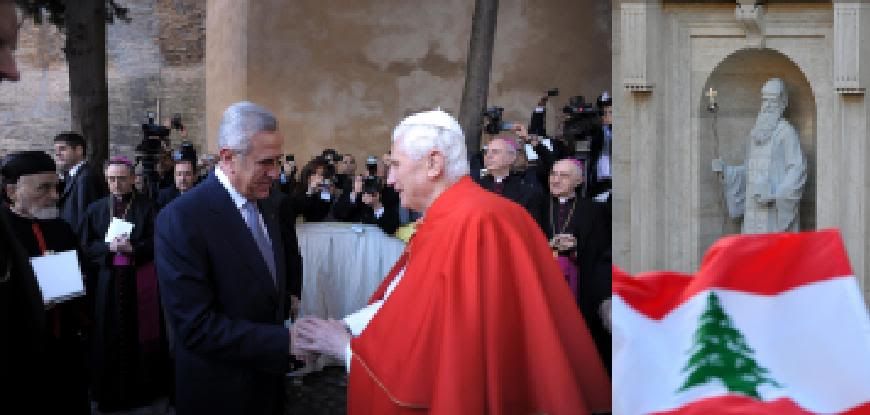
The Pope and the President first met briefly yesterday morning in the rear courtyard of St. Peter's Basilica, where the Pope unveiled and blessed a statue to St. Maron in the external Founders Gallery of the Basilica. Maron's death in the sixth-century after an exemplary and miracle-filled life inspired the founding of the Maronite Catholic Church. Lebanon is home to the Maronite Patriarchate of Antioch and the largest of the Maronite communities.
[Modificato da TERESA BENEDETTA 09/04/2012 03:23] |
| |
 25/02/2011 13:21 25/02/2011 13:21 |
|
| | | OFFLINE | | Post: 22.189
Post: 4.816 | Registrato il: 28/08/2005
Registrato il: 20/01/2009 | Administratore | Utente Master | |
|
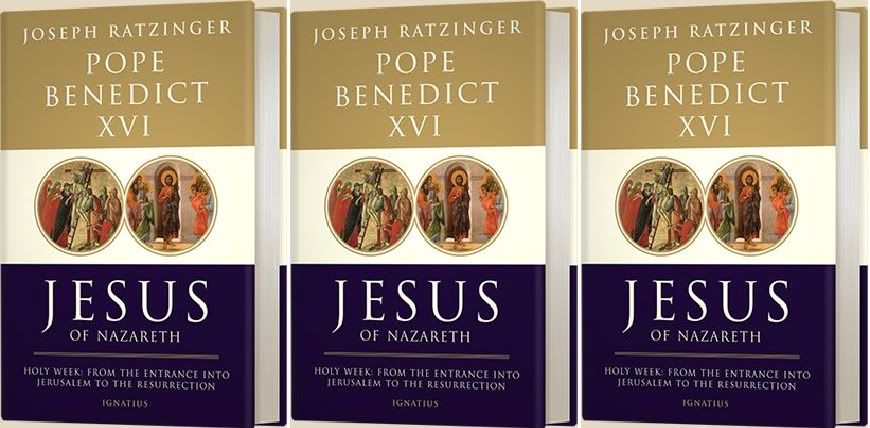
 -
American publishers of Joseph Ratzinger/Benedict XVI, have now opened a website
www.ignatius.com/promotions/jesus-of-nazareth/index.htm
for JESUS OF NAZARETH, Vol. II, which goes on sale in two weeks.
JON-II: A preview
Jesus of Nazareth – Holy Week: From the Entrance into Jerusalem to the Resurrection is the follow-up to Pope Benedict XVI's best-selling book, Jesus Of Nazareth: From the Baptism in the Jordan to the Transfiguration.
In this new work, Benedict challenges readers to contemplate the meaning and impact of Jesus's life. He looks at the days from Jesus's arrival in Jerusalem — to the herald of followers — to his suffering and death a few days later . . . and his resurrection and appearances to his apostles and disciples for another 40 days.
The Holy Father tackles many of history's most volatile questions about the final week of Jesus' earthly life:
- Who killed Jesus?
- Was Jesus a political revolutionary?
- Was he the Messiah, the Son of God?
- What did Jesus teach about the end of the world?
- Did Jesus establish a community of disciples — the Church — to continue his work?
- How did Jesus interpret his death?
- What does the evidence tell us about Jesus's ultimate fate?
- Did he really rise from the dead?
- Did the early Christians believe Jesus would return immediately?
Benedict answers those questions and more. The figure of Jesus that emerges from this study is of someone who is both divine and human; God's self-disclosure in his Son, who tells us about God but also about ourselves.
"It’s clear that what interests the Holy Father is helping people to know and love someone whom he knows and loves," said Ignatius Press Founder and Publisher Fr. Joseph Fessio. "But he does this as a scholar. This book is a bright star in the constellation of books about Jesus."
The following are endorsements of the book by early reviewers:
This theological masterpiece courageously confronts head-on two centuries of historical exegesis and establishes a fresh way of reading the Gospels as both biography and theology in a coherent way.
The author explains, "I set out to discover the real Jesus, on the basis of whom something like a Christology from below would then become possible. The quest for the historical Jesus, as conducted in mainstream critical exegesis in accordance with its hermeneutical presuppositions, lacks sufficient content to exert any significant historical impact. It is focused too much on the past for it to make possible a personal relationship with Jesus."
Here we find a compelling model for the presentation of the life of holy rabbi, Hillel or Aqiba, in the same context as we account for the life of Jesus".
- Jacob Neusner
Distinguished Service Professor of the History and Theology of Judaism
Senior Fellow, Institute of Advanced Theology, Bard College
On the Day of Pentecost, Peter sought to explain to the assembled multitude what God had done through Jesus of Nazareth, crucified and risen.
Peter's successor, Benedict XVI, here undertakes the same urgent task, in fruitful dialogue with the historical-critical biblical scholarship that dominates contemporary academic study of Jesus. Charting the path of the new evangelization, Pope Benedict XVI uncovers for us the living source of Peter's evangelizing mission: Jesus, in whom God gives hope to the world.
- Matthew Levering, PhD
Co-Editor, Nova et Vetera, and
Co-Director, Center for Catholic-Evangelical Dialogue
The JESUS OF NAZARETH project will be Pope Benedict's great legacy, just as the Theology of the Body has become the Venerable Pope John Paul's.
In this second volume he accomplishes many remarkable things, among them a positive and substantive contribution to the centuries-long Christian dialogue about expiation and atonement. This will be of great value to those who want to understand — and share with others — how our salvation is accomplished by Jesus's passion, death, and resurrection.
In particular, Benedict shows how the institution of the Eucharist on Holy Thursday is what transformed Jesus' death on Good Friday from being a Roman execution into the supreme sacrifice of God's redemptive love. Benedict's writing is a feast for the soul that deserves to be read and savored.
- Scott Hahn, PhD
Founder and Director of the St. Paul Center for Biblical Theology
Working from Scripture, the Church Fathers, and contemporary scholarship, Benedict XVI deftly brings together the historical and theological dimensions of the gospel portraits of Jesus.
This is a splendid, penetrating study of the central figure of Christian faith; a learned and spiritual illumination not only of who Jesus was, but who he is for us today.
+Charles J. Chaput, OFMCap
Archbishop of Denver
What better guide could you find than Benedict XVI to lead you on the bracing adventure of exploring the historical Jesus and discovering, under the tutelage of this most sage successor to Peter, the inner meaning of Jesus's death and resurrection.
Faith and reason are the two wings Benedict XVI takes up to lead us to astonishingly fresh spiritual perspectives and dizzying heights. This book often takes one's breath away, while infusing in the reader the God-breathed Word, which is the Gospel.
- Tim Gray, PhD
President, Augustine Institute
As is his first volume of Jesus of Nazareth, so, once again, in his second volume Pope Benedict XVI has authored a marvelous book, this time on the passion, death, and resurrection of Jesus.
What makes this study so attractive is the depth of its biblical insight, its attention to historical issues, its keen theological acumen, and its lucid and precise expression.
Moreover, as with the first volume, it is written in a serene and prayerful manner — a serenity and a prayerfulness that is conveyed to the heart and mind of the reader.
This book fulfills Pope Benedict's ardent desire — that it would "be helpful to all readers who seek to encounter Jesus and to believe in him."
- Thomas G. Weinandy, OFMCap
Executive Director for the Secretariat for Doctrine
United States Conference of Catholic Bishops
In this masterful interweaving of history and theology, Pope Benedict takes us to the heart of the Holy Week story. He reveals how the truth about Jesus is best grasped, not by minimalist scholarly reconstructions, but by profound meditation upon the Christ of the Gospels. A whole Lenten retreat in one volume.
- Ian Boxall
[DIM=9t]St. Stephen's House, Oxford
This second volume of Pope Benedict's "search for the face of the Lord" draws us ever deeper into the mysteries of Jesus's mission and life. At its heart glows a powerful meditation on the prayer of Jesus that draws into the mission of Christ the Saviour, and yet also toward the Saviour who lives among us still.
- Lewis Ayres
Bede Professor of Catholic Theology at Durham University
Benedict XVI writes with the deft touch of a mature scholar and an experienced teacher. He explains his often brilliant insights with simple clarity and the masterly phrase which enlightens and convinces.
His purpose is to give a reading which leads to a personal encounter with Christ. It is not just a historical study, but builds on the historico-critical method to arrive at a "faith-hermeneutic".
It does, of course, discuss historical problems, but the Pope's primary aim is "listening with Jesus' disciples across the ages". It is a reading of the Gospel not by a historian but by a historically alert theologian, writing from within the Church.
- Dom Henry Wansbrough, OSB
Appleforth Abbey
 It turns out that CTS (Catholic Truth Society), Ignatius Pres's publishing partner in the UK, has also started promoting the book on its site
It turns out that CTS (Catholic Truth Society), Ignatius Pres's publishing partner in the UK, has also started promoting the book on its site
ctscatholiccompass.org/category/jesus-of-nazareth-ii/
with an intriguing entry today by a familiar byline from Catholic Herald and the Daily Mail...
 'Jesus of Nazareth II':
'Jesus of Nazareth II':
Major news story tucked
into the Pope's text?
by Simon Caldwell
CTS blog
Feb. 25, 2011
Journalists and public relations consultants often tread common ground but their instincts are different. This is because generally they have functions that are diametrically opposed: the role of the journalist is primarily to bring stories into the public domain by seeking them out, discovering them and reporting them while PR operatives are often called upon to cover up, or bury, what journalists might think are the best stories.
They tend neither to like nor trust each other and occasionally will swear at one another down the telephone.
I am a freelance journalist slowly venturing into the world of PR. Imagine my delight to be handed an advance copy of Jesus of Nazareth Part Two: From Entrance into Jerusalem to the Resurrection, the forthcoming book by Pope Benedict XVI, some six weeks before its publication on March 10.
Had I been working solely as a religious journalist I would have killed for this text (not literally of course). But my brief was PR and it included the task of discerning the “incendiary” passages with a view to preparing a media strategy for the launch of the book.
I think the decision by the Catholic Truth Society, the publishers to the Holy See in the UK and Ireland, to ask a journalist to read this book was shrewd.
I have identified at least one major international story tucked away in the Pope’s text. “Incendiary” might indeed be the best way to describe it.
As a journalist I would like to tell you everything but as a PR consultant I labour under the strict terms of the embargo imposed by the Vatican.
So I can’t tell you what the big stories are (that’s the PR side out of the way) but what I can tell you is that Pope Benedict will again show his ability to surprise us. This is no dull theological tome. It is a meditation on the person of Jesus during his Passion, death and Resurrection by one of the Church’s greatest intellectuals.
The Pontiff also writes with pace and lucidity of style and his clarity of thought and insight are breathtaking. The narrative is simply gripping and I defy anyone to put down that book without being moved to the core.
If the Pope set out to bring Catholics closer to Christ by writing Jesus of Nazareth, I think that he will accomplish his objective.
But it is also in the apostolic nature of the Successor of St Peter to perhaps keep one eye on a wider audience. So within the text the reader may discover several themes that touch on topics of the day.
Fellow religion journalists, get yourself a good breakfast on the morning of March 10 because you might be in for a long and busy day.

[Modificato da TERESA BENEDETTA 25/02/2011 17:16] |
| |
 25/02/2011 18:45 25/02/2011 18:45 |
|
| | | OFFLINE | | Post: 22.190
Post: 4.817 | Registrato il: 28/08/2005
Registrato il: 20/01/2009 | Administratore | Utente Master | |
|
 Friday, February 25, Seventh Week in Ordinary Time
Friday, February 25, Seventh Week in Ordinary Time
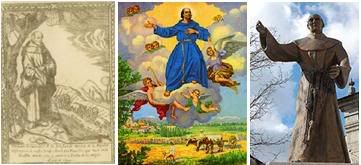 BLESSED SEBASTIAN DE APARICIO (b Spain 1502 - d Mexico 1600)
BLESSED SEBASTIAN DE APARICIO (b Spain 1502 - d Mexico 1600)
Roadbuilder, Franciscan brother
Beato Sebastian has one of the most unusual biographies. Born in Spain to a poor family, who brought him up in the faith, he fell ill with bubonic plague as a a boy, from which he was miraculously cured after having been isolated to avoid infecting his family. After various migrant jobs all over Spain, he emigrated at age 31 to Mexico where he started as a farm hand and jack of all trades, then decided to build roads that would facilitate commerce in the region. He is considered the father of Mexican highways, as well as Mexico's first 'cowboy' who domesticated wild horses and cattle to be used in farm work. He introduced ox-driven carts to replace the labor carried out by humans before then. By age 50, he was a wealthy man, who had a reputation for unfailing generosity and service to the natives. He then gave up the transport business to devote himself to agriculture and ranching. Part of his personal faith was his early vow to live a chaste life. In his 60s, he married twice - both times to provide his wife's family with a dowry, and with the understanding that it would be a chaste marriage. Both wives died within a year of marriage - the first of an illness, the second because she fell from a tree while picking fruit. He said of them, "God gave me two little doves to care for and send back to him". After this, he decided to become a Franciscan friar, giving away all his goods to the convent and to the poor. He spent his novitiate as cook, porter and gardener in a Poor Clares convent, and finally became a professed friar in 1575. He spent the next 23 years as alms-collector for his community, once again taken to the roads in his horse-drawn carts for a new purpose, and came to be known as the 'fraile de las carretas'. He never learned to read and write, and all his life, his prayers were limited to the Our Father and the Rosary. Many miracles started being attributed to him in the last 10 years of his life, and he died in the odor of sanctity at age 98. His incorrupt body is venerated in the Church of St. Francis in Puebla, Mexico. When he was beatified in 1789, 968 documented miracles were presented in his cause, of which more than 500 beneficiaries testified personally.
Readings for today's Mass: www.usccb.org/nab/readings/022511.shtml
OR today.
 The main story above the fold is continuing coverage of the situation in Libya where Muammar Qaddhafi has set mercenaries and aircraft in an effort to suppress the popular uprising against him. A related story in the inside pages is an interview with Cardinal Robert Sarah, president of the pontifical charity Cor Unum, who is African, on the problems of the continent exemplified right now by the revolutionary changes in North Africa. Page 1 papal story is a brief account of the Holy Father's meeting with the President of Lebanon. Other Page 1 stories: An essay by Cardinal Marc Ouellet on the 'anthropological novelty' of Christianity commenting on Benedict XVI's decree establishing the Pontifical Council for Promoting New Evangelization; and brief items on the immigration crisis facing the European Union; UN figures indicate that the overall unemployment rate in the troubled countries of North Africa from Egypt in the east to Morocco in the West is 9.8%, but that the work force aged 25 or younger is at almost 25% unemployment [The shocking thing is that the US was at 9.8% general unemployment until last December, when some improvement brought it down to 9.5%.]; and Chinese businesses in Sao Paolo, the economic capital of Brazil, register a growing presence.
PAPAL EVENTS TODAY
The main story above the fold is continuing coverage of the situation in Libya where Muammar Qaddhafi has set mercenaries and aircraft in an effort to suppress the popular uprising against him. A related story in the inside pages is an interview with Cardinal Robert Sarah, president of the pontifical charity Cor Unum, who is African, on the problems of the continent exemplified right now by the revolutionary changes in North Africa. Page 1 papal story is a brief account of the Holy Father's meeting with the President of Lebanon. Other Page 1 stories: An essay by Cardinal Marc Ouellet on the 'anthropological novelty' of Christianity commenting on Benedict XVI's decree establishing the Pontifical Council for Promoting New Evangelization; and brief items on the immigration crisis facing the European Union; UN figures indicate that the overall unemployment rate in the troubled countries of North Africa from Egypt in the east to Morocco in the West is 9.8%, but that the work force aged 25 or younger is at almost 25% unemployment [The shocking thing is that the US was at 9.8% general unemployment until last December, when some improvement brought it down to 9.5%.]; and Chinese businesses in Sao Paolo, the economic capital of Brazil, register a growing presence.
PAPAL EVENTS TODAY
The Holy Father met with
- His Beatitude. Cardinal Nasrallah Pierre Sfeir, Patriarch of Antioch of the Maronites (Lebanon), who recently
asked to be able to resign as Patriarch
- Bishops from the Philippines (southern region, Group 1) on ad limina visit. Individual meetings.
- Mons. Pierre Morissette, Bishop of Saint-Jérôme (Canada), and president of the Canadian bishops' conference,
and the CBC vice president and secretary
In the afternoon, he met with
- Cardinal Ivan Dias, Prefect of the Congregation for the Evangelization of Peoples (regular meeting)
The Vatican announced a news conference on March to present the Lineamenta (Orientations) of
the 13th General Assembly of the Bishops' Synod to be held in the Vatican on Oct. 7-28, 2012)
on the subject, "New evangelization for the transmission of the Christian faith".
NB: The fuzzy picture of the Pope with the Lebanese delegation on Page 1 of OR today is yet another inexplicable instance of editorial perverseness. The aim was apparently to highlight the Plexiglas-enclosed gift in in the foreground, which (a) would have photographed hazy, regardless, because of the Plexiglas, and (b) it's not as if it were the Holy Grail that it should take precedence over the persons at the event! This pucture choice violates elementary No-Nos that even a highschool newspaper editor would find too obvious to violate!
Equally perverse, the headline for the brief item that accompanies the photo is "At the audience with the President of Lebanon, the Pope appeals for all open conflicts in the Arab world to be resolved' - a line that does not appear in the official communique of the meeting, and yet the item itself is not posted online...

- On the 150th anniversary of the newspaper, OR editor Giovanni Maria Vian tells the AP, in English, about the controversial 'pop' articles it has chosen to run: "We 'sexed up' the news a bit. We had fun doing it. But the argument was not banal." (I will post the article in the CHURCH&VATICAN thread).
(He was referring specifically to the article asserting that the characters in the TV cartoon series ;The Simpsons' are Catholic, which is factually false. But even assuming the Simpsons are Catholic, should the Pope's newspaper play them up in such a way as though they were a model for Catholics?
As erudite and scholarly as Mr. Vian may be and solidly Catholic, his editorial judgment certainly leaves much to be desired. And who is cavalier enough as not to cite the sources for most of the non-Vatican hard news it has been reporting, which are mainly summaries and paraphrases of reports from various news agencies and newspapers. That's dishonest and unworthy of 'the Pope's newspaper'.
For the responsibility that he holds and for the trust shown in him by the Pope, Mr. Vian owes it to his readers and to himself to take stock of his professional weaknesses and do something about it. All he has to do is look at what Avvenire is and does.
There are creative and fairly simple ways to be the Vatican's official newspaper of record - in terms of papal texts and appointments - while being able to convey the sense and the facts of the world in which the Pontificate and the Church are operating. But not necssarily by randomly mixing up Vatican news and commentary with the hard news to come up with a Page 1 layout that looks like any other newspaper, because it is not any other newspaper.
[Modificato da TERESA BENEDETTA 25/02/2011 19:34] |
| |
 25/02/2011 21:12 25/02/2011 21:12 |
|
| | | OFFLINE | | Post: 22.191
Post: 4.818 | Registrato il: 28/08/2005
Registrato il: 20/01/2009 | Administratore | Utente Master | |
|
 BBC has a news item I was going to translate from Italian... This report comes on the same day that the US Feds arrest and arraign a 20-year-old Saudi Arabian who came to Texas to study chemistry and how to make bombs, and whose computer shows he has put together bomb components to bomb US targets starting with former President George's W. Bush's home in Dallas... He was acting on his own, it appears from all evidence. These incidents point to a new and more frightening generation of Muslim extremists who do not need to belong to an organization but act out their hostilities on their own, believing their clerics who teach that Allah wants them to kill all infidels and will reward them instantly in Paradise..
Italy arrests Moroccans for
BBC has a news item I was going to translate from Italian... This report comes on the same day that the US Feds arrest and arraign a 20-year-old Saudi Arabian who came to Texas to study chemistry and how to make bombs, and whose computer shows he has put together bomb components to bomb US targets starting with former President George's W. Bush's home in Dallas... He was acting on his own, it appears from all evidence. These incidents point to a new and more frightening generation of Muslim extremists who do not need to belong to an organization but act out their hostilities on their own, believing their clerics who teach that Allah wants them to kill all infidels and will reward them instantly in Paradise..
Italy arrests Moroccans for
inciting hatred of Pope
and convert Magdi Allam

February 25, 2011
Six Moroccan men have been arrested in northern Italy on suspicion of seeking to incite hatred of Pope Benedict among Muslims.
Police in the city of Brescia said the suspects had allegedly banded together to stir up religious hatred.
A note was found calling for the Pope to be punished for converting a Muslim journalist to Roman Catholicism.
According to another source, the suspects are not suspected of planning attacks.
Five of the men, who are all Brescia residents, were placed under house arrest while the sixth was taken into custody.
The note found by police urges Muslim immigrants not to integrate into Italian society, Italian media report.
Police said the six were accused of "setting up a group that aimed to incite discrimination, racial and religious hatred, violence and jihad against Christians and Jews".
The Pope was condemned for converting Egyptian-born Magdi Allam, a former deputy editor of the Italian daily Corriere della Sera.
Mr Allam, an outspoken critic of Muslim militancy and strong supporter of Israel, was baptised by the Pope in March 2008.
The following story is more disturbing - or perhaps more outrageous, or bettere yet, both - for the latter part of the news item about statements made recently by some ranking Egyptian Muslims who came to Rome for a Sant'Egidio meeting, and who dredge up recriminations and prepposterous demands against Benedict XVI not just for the Regensburg lecture but all the way back to the Crusades!...
Uncertain future for
dialog with Al-Azhar
by Alan Holdren

Vatican City, Feb 25, 2011 (CNA/EWTN News) - Dialogue will continue on God's time, said a Vatican official as talks with an top Egyptian authority of Islam suffered a blow this week.
 Grand Imam al-Tayyeb, Al-Azhar Mosque and Al-Azhar University, Cairo.
Grand Imam al-Tayyeb, Al-Azhar Mosque and Al-Azhar University, Cairo.
A two-day meeting between the Vatican and an Egyptian institute of Sunni Islam set for Feb. 23-24 was suspended. Egyptian officials have said unofficially that the future of dialogue hinges on an apology from the Pope.
[The cancellation took place just before the change of government in Egypt. If it had not been cancelled, it most likely would have been cancelled after Mubarak left. His government appointed the hostile Imam al-Tayyeb, who had been the Grand Mufti of Egypt (chief legal officer for the administration of Sharia), to be first the Grand Imam of Cairo's oldest and most prestigious mosque, Al-Azhar, and then, concurrently rector of its associated university, host for the annual Catholic-Muslim talks.]
The Vatican and the highest authority of Sunni Islam, Cairo's Al-Azhar Institute, planned to continue ongoing talks on theology during the sessions. The two sides normally meet twice per year, but this week's dates came and went without a sound.
The bombing of the Coptic Christian Church in Alexandria, Egypt after a New Year's Mass nearly two months ago was the first in a series of events that led to the suspension.
In the days that followed, Pope Benedict XVI condemned the attack and called for greater religious liberty in Egypt and protection for all citizens. His words appear to have been perceived by the government through media reports as possible calls for Western action in the country.
To clarify the meaning of the statements, the nation recalled its Holy See ambassador to Cairo. [Not to clarify the meaning - which the Nuncio in Cairo, Mons. Michael Fitzgerald, had done immediately, but as a gesture of protest, which came several days after Imam Al-Tayyeb first voiced his erroneous denunciation of the Pope.]
On Jan. 20, the Al-Azhar institute issued a press release in which they announced the suspension of theological dialogue with the Vatican. They said the Vatican had interfered in the nation's affairs.
The president of the Pontifical Council for Inter-Religious Dialogue Cardinal Jean-Louis Tauran, told L'Osservatore Romano on Jan. 29 that the Vatican delegation expected all future appointments to be kept.
“If we want progress in dialogue,” he added, “we must first of all find the time to sit down and talk person-to-person and not through the newspapers.”
Days before the meetings were set to take place, on Feb. 20, he told the French agency I.Media, “we don't have any news from our friends.”
The government announced that their ambassador would return to Rome at mid-week, but there was still no official word from Al-Azhar.
Feb. 23-24 came and went with no statement about the talks. Incidentally, an official from Al-Azhar and the institute's former spokesman were in Rome to participate in a forum sponsored by the Catholic Church's Sant'Egidio Community.
Away from the microphones at the event, the two made separate statements to media on their thoughts on how dialogue can continue.
In a report from Italy's ASCA news agency, the special representative of the Grand Imam of Azhar, Hasan Shafie, said that for the dialogue to be reopened. the Pope must apologize for his words on Islam and Muslims in his now famous address at Regensburg, Germany in 2006.
The speech provoked furor among some Muslim leaders after some phrases were taken out of context and reproduced in misleading mass media reports.
The Pope quoted a 14th-century Christian emperor who approached a Persian thinker to get a better understanding of Islam. The emperor asked, “Show me just what Muhammad brought that was new, and there you will find things only evil and inhuman, such as his command to spread by the sword the faith he preached.”
The Pope used the quote to illustrate that a greater understanding is needed between faiths through dialogue, explained the Vatican's spokesman Fr. Federico Lombardi after Muslim leaders expressed outrage at the quote.
Fr. Lombardi explained that the Pope respects Islam and wants to “cultivate an attitude of respect and dialogue toward the other religions and cultures, obviously also toward Islam.”
After the miscommunication with the Egyptian government in January, Fr. Lombardi again stepped in to say that “an attentive reading” of the Pope's words on religious freedom would help to dispel this latest the round of “misunderstandings.”
According to ASCA, on Feb. 23, Shafie called this response “another insult” because it assumed they did not understand it well the first time around.
Muhammad Rifaa Al-Tahtawi, Al-Azhar's spokesman until just recently, was also at the Sant'Egidio meeting. He said Muslims need to see a “show of respect” from the Vatican.
According to the National Catholic Register, al-Tahtawi said the Vatican's response to Regensburg was “not acceptable.”
Asked why they have not been able to forgive the Pope, despite his efforts rectify the situation, Al-Tahtawi said, “It's not a question of forgiveness.
“He has given an apology for the Holocaust, but there has been no apology for the Crusades. (We) need this. Why? Because the Pope is not only considered chief of Catholics, he is a man of universal authority.”
He also asked the Pope to condemn the Israeli occupation of Palestine.Pontifical Council for Inter-religious Dialogue official Msgr. Khaled Akasheh, member of the committee for dialogue with Al-Azhar told CNA over the phone on Feb. 25 that these were personal statements and the council is treating them as such.
He said that they “work on the official things.”
“Everyone on a personal level can assert whatever they wish, but this does not commit their institution or ours,” he explained.
The two Egyptians speak for themselves and not Al-Azhar, he reiterated. For now, Msgr. Akasheh said that dialogue will continue “Whenever God wishes.”
Asked when that might be, he said, “we don't know yet. We have to wait.”
Father Ciro Benedettini, vice director of the Holy See's Press Office confirmed the temporary suspension of meetings with Al-Azhar. “The Holy See is committed to the dialogue and will pursue all its efforts to overcome the problems,” he told CNA.
[I must look up the reports on that Sant'Egidio meeting. The Sant'Egidio community must be commended for its multiple initiatives around the world marked not only by service to Catholic communities but by an outreach that makes no distinction of religion or race. However, it has also been the leading advocate for the counter-productive kumbaya type of inter-religious 'dialog', where meetings are characterized by 'I'm good, you're good, we're all good' while glossing over the fundamental differences among faiths - and then, offstage, the hostilities are vented as the two Muslims do in this story!]
[Modificato da TERESA BENEDETTA 25/02/2011 22:35] |
| |
 26/02/2011 03:11 26/02/2011 03:11 |
|
| | | OFFLINE | | Post: 22.192
Post: 4.819 | Registrato il: 28/08/2005
Registrato il: 20/01/2009 | Administratore | Utente Master | |
|
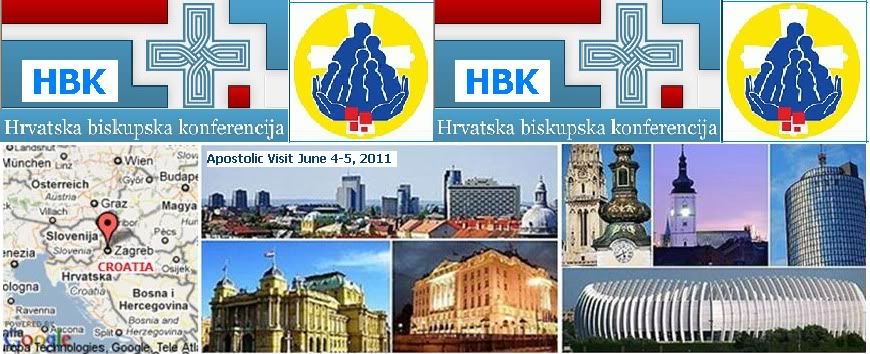 Croatian bishops present
Croatian bishops present
new details for Pope's visit

ZAGREB, Feb. 25 (SIR) - A family held between God’s hands: this is the logo of Benedict XVI’s visit to Croatia on June 4-5.
he logo takes inspiration from National Family Day, which will be celebrated to coincide with the Pontiff’s visit.
Developed by the paper of the Croatian Bishops Conference Glas Koncila, the logo shows an expectant mother alongside the father and three children; a cross in the background stands for the Christian faith of the family between the hands of God to whom they entrust themselves.
The main colours of the logo – yellow, white and blue – recall those of the Vatican City and the city of Zagreb. The slogan chosen for the Pope’s visit is “Together in Christ”.
The highlight of the Pope’s visit will be a Mass in Zagreb to be attended by the faithful not only from Croatia but also from Bosnia-Herzegovina and other nearby countries.
|
| |
 26/02/2011 12:59 26/02/2011 12:59 |
|
| | | OFFLINE | | Post: 22.195
Post: 4.821 | Registrato il: 28/08/2005
Registrato il: 20/01/2009 | Administratore | Utente Master | |
|
Friday, February 26
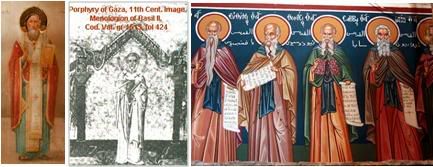 Photos on the left and right from the Church of St. Porphyrius in Gaza.
ST. PORPHYRIUS OF GAZA (b Thessalonica 353, d Gaza 421), Bishop and Confessor
Photos on the left and right from the Church of St. Porphyrius in Gaza.
ST. PORPHYRIUS OF GAZA (b Thessalonica 353, d Gaza 421), Bishop and Confessor
Born on the European mainland, he came to Jerusalem where he was ordained a priest at the age of 40.
Before that, he had spent much time living in the desert and in caves as an ascetic, and had a reputation
for generosity to the poor. At age 45, he was elected unexpectedly by the tiny Christian community in
Gaza to be their bishop. Gaza in the early 5th century was a center of paganism. With patient work,
Porphyrius tended his flock and preached to pagans, and some time in 401-402, he went to Constantinople
to ask the Emperor for a decree ordering the destruction of the pagan temples in the city. He served for
another 20 years. A Life of Porphyrius written by his deacon Mark survives today in modern
editions.
Readings for today's Mass: www.usccb.org/nab/readings/022611.shtml
|
| |
 26/02/2011 14:02 26/02/2011 14:02 |
|
| | | OFFLINE | | Post: 22.197
Post: 4.823 | Registrato il: 28/08/2005
Registrato il: 20/01/2009 | Administratore | Utente Master | |
|
 Saturday, February 26, Seventh Week in Ordinary Time
Saturday, February 26, Seventh Week in Ordinary Time
 Photos on the left and right from the Church of St. Porphyrius in Gaza.
ST. PORPHYRIUS OF GAZA (b Thessalonica 353, d Gaza 421), Bishop and Confessor
Photos on the left and right from the Church of St. Porphyrius in Gaza.
ST. PORPHYRIUS OF GAZA (b Thessalonica 353, d Gaza 421), Bishop and Confessor
Born on the European mainland, he came to Jerusalem where he was ordained a priest at the age of 40.
Before that, he had spent much time living in the desert and in caves as an ascetic, and had a reputation
for generosity to the poor. At age 45, he was elected unexpectedly by the tiny Christian community in
Gaza to be their bishop. Gaza in the early 5th century was a center of paganism. With patient work,
Porphyrius tended his flock and preached to pagans, and some time in 401-402, he went to Constantinople
to ask the Emperor for a decree ordering the destruction of the pagan temples in the city. He served for
another 20 years. A Life of Porphyrius written by his deacon Mark survives today in modern
editions.
Readings for today's Mass: www.usccb.org/nab/readings/022611.shtml
OR today.
The only Pope-related story in the issue is a Page 1 report entitled 'The Pope is right' on the recent Harvard study showing that monogamous sexual relations had significantly reduced the HIV infection rate in Zimbabwe in the period from 1997-2007. (I posted a story on this on Page 186 of this thread on 2/13 as a translation from a MissiOnline post on 2/12, with a link to the full report on the study. It's very disturbing that the OR takes notice of the report only two weeks later - especially since MissiOnline is one of the information agencies of the Pontifical Institute for Foreign Missions.) Other Page 1 news: President Obama feels confident that the Libyan crisis will not result in higher oil prices, as Saudi Arabia pledges to step up production to cover any disruptions in the oil supply from Libya; Russia pledges to spend $680 billion in the next 10 years to insure that its military might will not be surpassed by China; and thousands continue to flee Darfur as government forces bombard villages in the territory of Muslim rebels.
PAPAL EVENTS TODAY
The Holy Father met with
- Seven bishops from the Philippines (southern region, Group 2) on ad limina visit. Individual meetings.
- Participants in the General Aseembly of the Pontifical Council for Life, Address in Italian.
And in the afternoon with
- Cardinal Marc Ouellet, P.S.S., Prefect of the Congregation for Bishops (weekly meeting)
The Vatican also released the text of a letter from the Holy Father to His Beatitude, Cardinal Nasrallah Pierre Sfeir,
paying tribute to his lifelong service to the Church, in accepting his resignation as Patriarch of Antioch of the
Maronites, for reasons of age. He will be 91 in May.
[Modificato da TERESA BENEDETTA 26/02/2011 14:18] |
| |
 01/03/2011 10:06 01/03/2011 10:06 |
|
| | | OFFLINE | | Post: 22.198
Post: 4.824 | Registrato il: 28/08/2005
Registrato il: 20/01/2009 | Administratore | Utente Master | |
|
SORRY FOR THE ENFORCED ABSENCE. On Saturday morning, after my first entry, my PC froze so I had to re-start it. When I did, I ran my anti-virus and registry leaner programs as I always do when re-starting and was alerted to at least five attacks identified as "Fake warning of infection" - of which the cleaner was able to get rid of only four. I soon found out what that meant.
I could not get beyond the Internet Explorer screen without a VIRUS ALERT from the PC's Windows security system, on the grounds that unless I cleaned the system of 77 viruses, my PC was not safe to use. I had never seen this program before, but it had obviously attached itself to the Windows Security button on the lower right corner of the screen, and when I pursued it, the next screen was asking me to buy the software so it could clean my system. I was not about to buy another program, especially not a malicious one, when I have one that has served me for years and for which I pay $75 a year. When the Alert would not go away nor allow me to do anything - not even to use offline programs like Word or Powerpoint - unless I bought the program, I called up a friend who knows computers and who sometimes troubleshoots ny glitches through Team Viewer by which he can get into my PC from his PC, but of course, that wasn't working this time since it is an online program.
And yes, my PC had been attacked by a virus that cleverly takes the form of a 'fake warning' of infection, when it is the infection itself, unless you buy into their unsolicited wares but is nonetheless able to paralyze your PC this way... I could not do anything till Monday when I could go to my provider Time-Warner to get a new Modem with a USB-USB Internet cable (instead of the Ethernet connection my PC uses), so I could hook up Internet service to my laptop. Then, because of heavy traffic on Time-Warner's support line, I had to wait till after midnight to call their Technical Support for assistance in installing the service into my laptop...
So finally, I am back online and will try to catch up... Bear with me. I will probably leave enough postboxes to accommodate the Saturday and Sunday papal events (that`I will then go back to reconstruct)`then try to pick up the Monday events before picking up from Tuesday...
Chere Beatrice, j'ai vu ton message a peine... Many thanks for your concern and kind words. This explains my 'absence'. Moi aussi, j'aime ton site - c'est inestimable! Merci du tout...
[Modificato da TERESA BENEDETTA 14/03/2011 22:42] |
| |
 01/03/2011 10:10 01/03/2011 10:10 |
|
| | | OFFLINE | | Post: 22.199
Post: 4.825 | Registrato il: 28/08/2005
Registrato il: 20/01/2009 | Administratore | Utente Master | |
|
Space for
Pope's Letter to Cardinal Sfeir, 2/26/11
To translate from French
I am fascinated by the Eastern Patriarchs - their biodata are generally fascinating, like Cardinal Husar of the Ukraine who recently retired, too, and Cardinal Sfeir who looks amazing for 90 going on 91....
CNS filed this story on Cardinal Sfeir Monday.
90-year-old Maronite Patriarch resigns

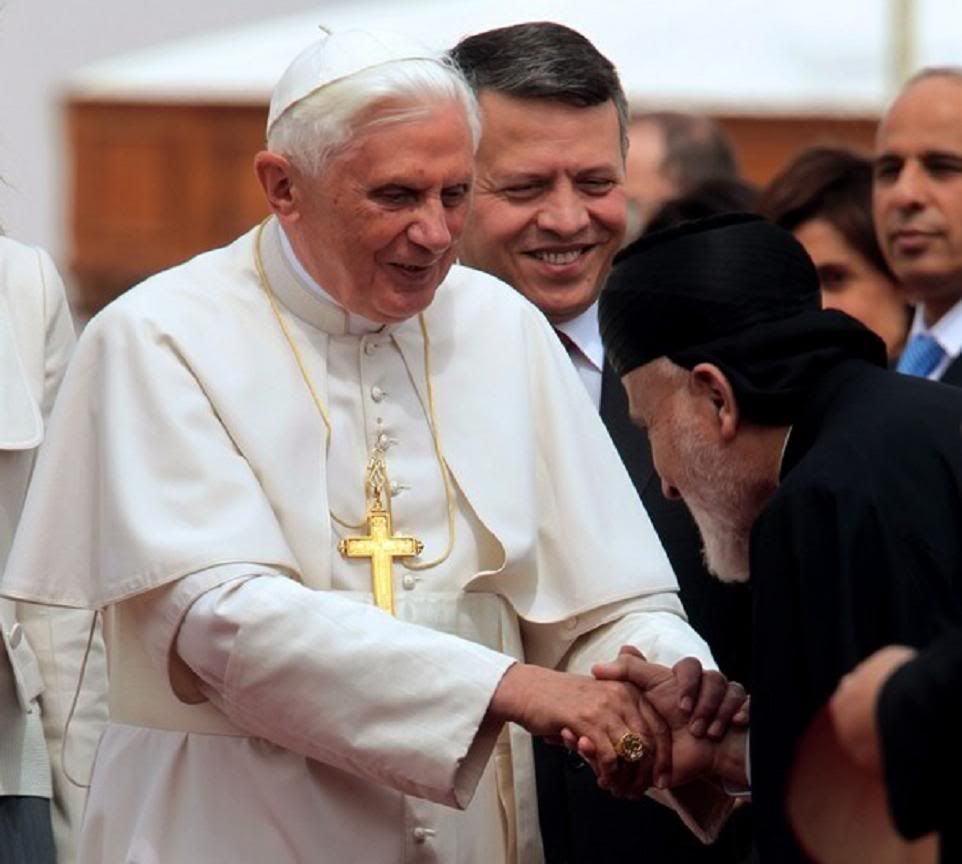 Cardinal Sfeir greets the Holy Father when he arrived in Jordan in May 2009. Also sbown, Jordan's King Abdullah. This is the only picture I could find online showing the Pope and Sfeir together.
Cardinal Sfeir greets the Holy Father when he arrived in Jordan in May 2009. Also sbown, Jordan's King Abdullah. This is the only picture I could find online showing the Pope and Sfeir together.
VATICAN CITY Feb. 28 (CNS) -- Pope Benedict XVI has accepted the resignation of Lebanese Cardinal Nasrallah P. Sfeir, the 90-year-old head of the Maronite Catholic Church.
In a letter Feb. 26, Pope Benedict said the cardinal began his ministry as patriarch or head of the Maronite Church in 1986, "in the turmoil of the war that bloodied Lebanon for too many years. With the ardent desire for peace for your country, you have guided this church and traveled the world to comfort your people who were forced to emigrate."
"Peace finally came back," the Pope said, and while it is "always fragile," it continues to reign in Lebanon.
As the head of an Eastern Catholic Church, Cardinal Sfeir could have served for life but chose to ask the Pope to accept his resignation.
In a country where religious identity and political identity often are entwined, Cardinal Sfeir has been criticized at times for being too political, while at other times he was criticized for not engaging directly enough in the practical affairs of the country.
During Lebanon's civil war, Cardinal Sfeir tried to continue the tradition of the Maronite patriarch serving as a reference point of Lebanese cultural identity in a way that would bring the country's Christians and Muslims together; he urged Christians and Muslims to stop fighting, to respect one another and to rebuild the country.
In 1990, during a Christian vs. Christian battle for East Beirut, the cardinal-designate threatened to excommunicate anyone ordering or carrying out a shooting.
In November 1989, supporters of one Christian leader, Gen. Michel Aoun, broke into the patriarch's Beirut offices and ransacked them, dragged the patriarch from his bed and asked him to kiss the general's picture. The cardinal said he refused.
Born May 15, 1920, in Reyfoun, Lebanon, he attended the seminary in Beirut and studied at the theology school of the Jesuit-run St. Joseph University in the capital. He was ordained to the priesthood a week before his 30th birthday.
In 1956, he was named secretary of the patriarchate, and the Maronite bishops elected him to be a bishop in June 1961. They elected him patriarch in 1986, and Pope John Paul II made him a cardinal in 1994.
[Modificato da TERESA BENEDETTA 01/03/2011 10:35] |
| |
|
|
|
|